DEKE DELIVERS ASSISTANCE TO UKRAINE
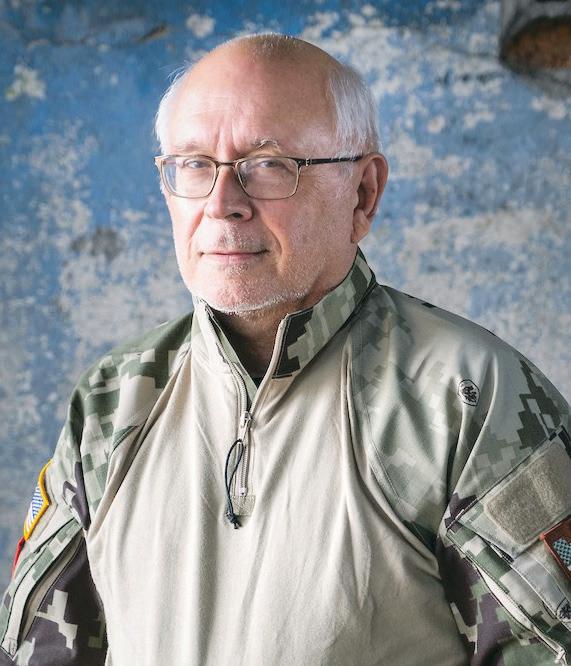
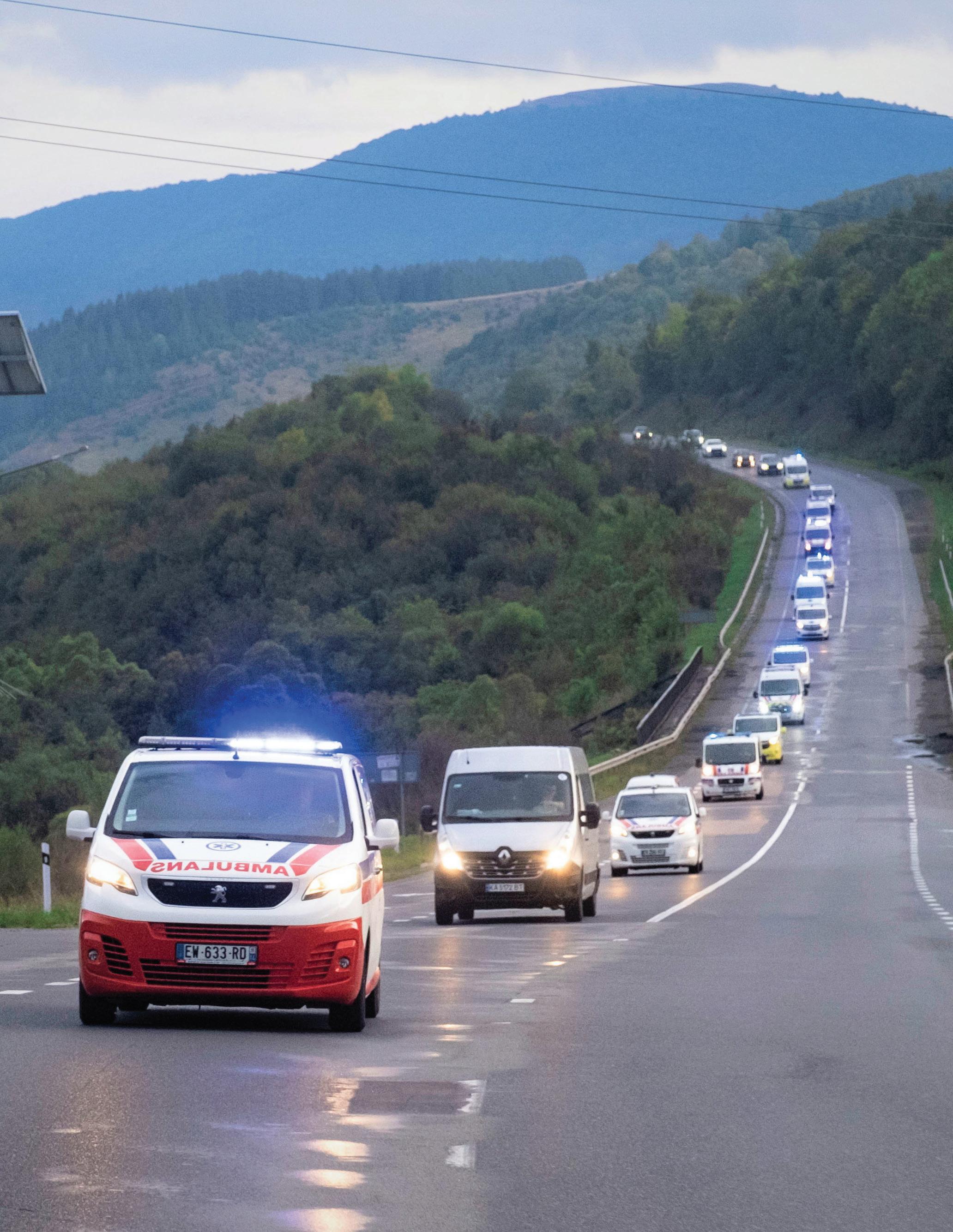
Dear Brothers and Friends,
We are pleased to deliver this winter edition of the DEKE Quarterly. I hope you enjoy it.
I was looking forward to sharing some bright perspectives in this note, but I’m committed to address a serious and somber matter.

On November 17th, my friends and I were stunned by the sudden loss of one of our Lambda brothers. Before we could begin to understand that tragedy, the horrible news repeated itself on December 22nd. Two wonderful men, 59 and 58 years old, fathers, husbands, brothers, sons; gone. Families, lives, and careers left abruptly.
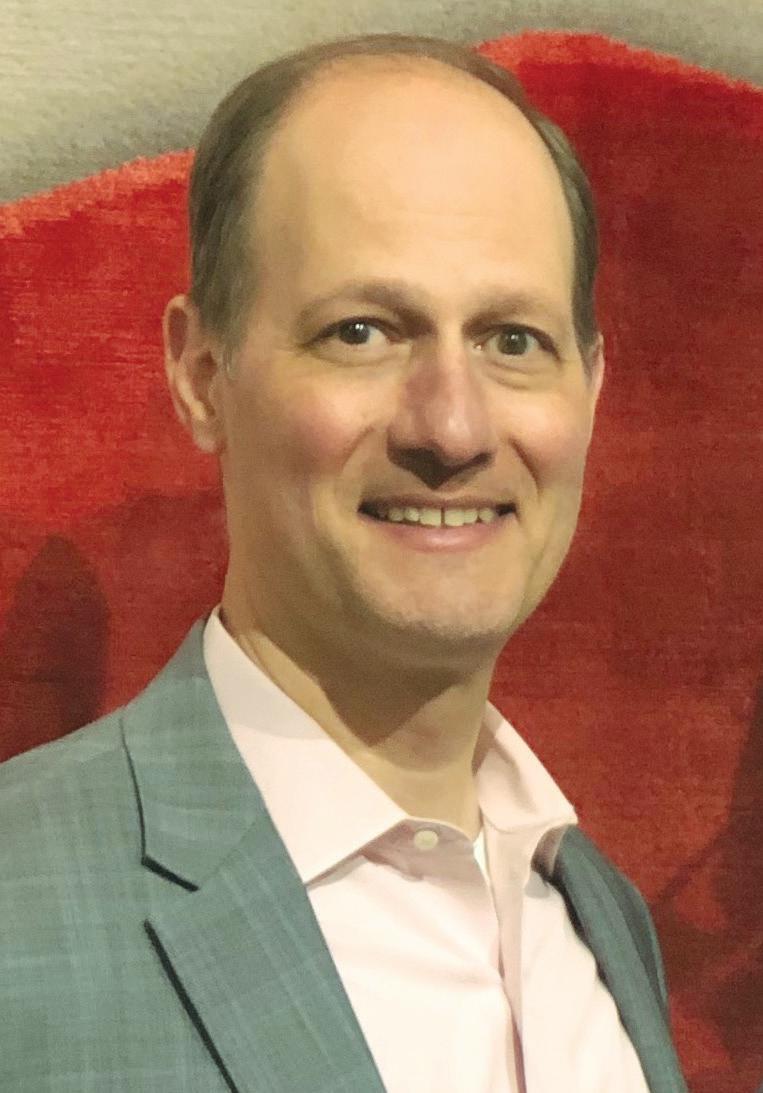
In an uncomfortable coincidence, I came across a late November article in The Wall Street Journal that addressed a building health crisis: the suicide rate among middle aged men. There was no way that I would accept these tangible losses to be part of a statistic. For years, our fraternity has thoughtfully added mental health programs for our undergraduates. But, beyond that, I hadn’t confronted the breadth of this tragic issue. That has all changed for me.
During the first two weeks of January, brothers gathered for a pair of memorial services. We tried as best we could to offer some support to grieving family members. In that effort, the Lambda men also pulled close and lifted each other up. These events became sad reunions for some of us, having not seen one another for three decades. Two things became abundantly clear. First, we are obligated to speak about mental health, and to be more deliberate and honest about the topic. We need to reach out to people with greater frequency and with deeper inquiry. Second, we want to connect with one another sooner, rather than later. For many of us who gathered, time seemed to stand still in regards to our relationships. It was as if conversations from twenty or thirty years ago had merely paused, and now simply resumed where they had left off. There is no ‘silver lining’ here but clearly the bonds formed years ago were more relevant than ever, providing a balm and some context to a very painful tragedy.
In the Bonds,
Mason Morjikian Chairman of the Board Lambda-Kenyon ‘88IN THIS ISSUE
THIS OLD DEKE HOUSE: A TALE OF TWO RENOVATIONS 15
YOUNG DEKE ENTREPRENEURS: MATT AO; SIGMA KAPPA 2014
PUBLISHED BY
Delta Kappa Epsilon International
6921 Jackson Rd., Suite 400
Ann Arbor, MI 48103
(734) 302-4210
www.dke.org
ΔKE BOARD OF DIRECTORS
Mason Morjikian, Lambda ‘88, Chairman
Neilson Brown, Beta ‘67, Vice Chairman
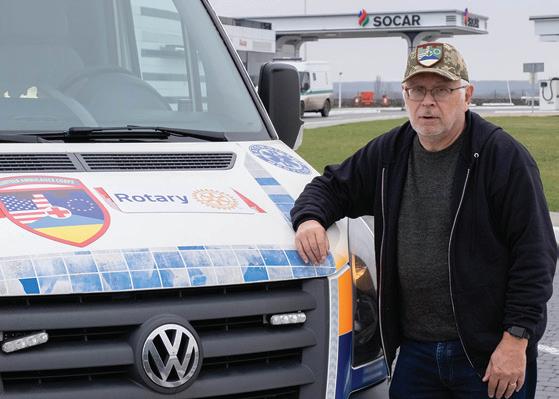
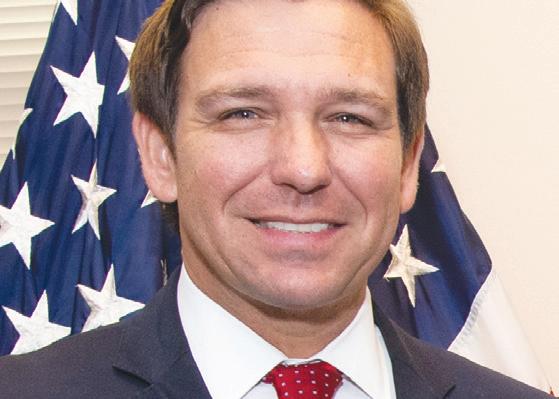
David Helverson, Delta Pi ‘81, Treasurer
Grant Burnyeat, Phi Alpha ‘65, Honorary President
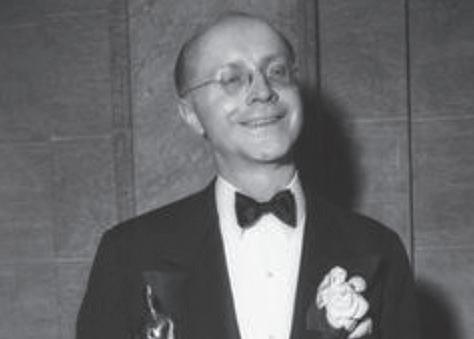
Cory Crenshaw, Tau Lambda ‘01
Christian Cummings, Epsilon Rho ‘18
Mike DeLisi, Rho ‘03
Semmes Favrot, Psi ‘82
Ray Reynolds Graves, Alpha Chi ‘67
Ron Li, Phi Alpha ‘10
Stanford McMillan, Gamma ‘89
John McNeil, Psi ‘79
Kevin O’Bryon, Tau Lambda ‘77
Terry Stewart, Phi Chi ‘69
John Yerger, Delta Chi ‘82
ΔKE HQ STAFF
Executive Director: Doug Lanpher, Gamma ‘77
Director of Member Services: Trey Robb, M.Ed.
Director of Alumni Services and Marketing:
Craig Dick, Phi Alpha ‘16
Director of Administrative Services:
Turner Spears, Lambda Tau ‘16
GUEST AUTHOR TERRY MILLER, RHO LAMBDA 1969: DEKE HISTORY: CUBA’S MARIO GARCIA MENOCAL
Associate Director for Chapter Resources:
Dustin Stewart
Assistant Director of Chapter Services:
Morgan McElroy, Phi Epsilon ‘21
Archivist & Historian: Grant Burnyeat, Phi Alpha ‘65
Chapter Consultant: Taft Peck, Delta ‘22
Chapter Consultant: Tim Treffery, Zeta Theta ‘22
Marketing Coordinator: Carter Nolan, Delta Tau ‘23
DEKE QUARTERLY STAFF
Publisher: Doug Lanpher, Gamma ‘77
Editor: Kevin Cuneo, Gamma ‘77
Assistant Editor: Michael E. Hilts, Gamma ‘76
Production Editor: Jeff Hamilton Gamma ‘78
CREATIVE DIRECTION & DESIGN: Scott-Goodman Associates
Lester Goodman • lestergcreative.com
Barbara Scott-Goodman • barbarascottgoodman.net
THE DEKE QUARTERLY is published by Delta Kappa Epsilon in Fall, Winter, Spring, and Summer.
DIGITAL VERSIONS: https://issuu.com/dkequarterly
POSTMASTER: Send address changes & correspondence to: DEKE Quarterly, 6921 Jackson Rd., Suite 400, Ann Arbor, MI 48103
Manuscripts, literature, and letters should be addressed to the Editor. Submissions will not be returned.
For change of address please contact ΔKE HQ and provide Full Name, Chapter, both old and new address.
Copyright ©2023 Delta Kappa Epsilon
HQ REPORT
Greetings Fellow Deke Brothers,
Once in a while in this space I write about how DKE is doing as a business. Since DKE is funded almost entirely by our alumni and undergraduate members, you deserve to know how we’re managing DKE financially and otherwise.
From a governance perspective, DKE’s governing body is a 15-man volunteer Board of Directors, who contribute their time and talent in providing strategic direction for the fraternity. A similar Board of Trustees provides direction for the Deke Foundation, and our newest entity, the Deke Property Group, also is governed by a Board of Directors. All of these entities are related to DKE if not under its direct control. Each entity’s Board contains one or two members of the DKE Board. In case you are curious, the Deke Club of New York is also a separately governed entity.
Doug Lanpher, Executive Directorexperience. Besides liability, DKE also maintains directors and officers coverage and other ancillary policies.
Currently DKE has two pending claims against us, one of which is covered by the liability policy and one which is not. The one which is not is, incredibly, a claim for an incident that the claimant says occurred in 1984, but was only filed in 2021. The reason it’s not covered is that we did not have a general liability policy in 1984. Such is life in today’s world that we are being called on to defend ourselves from an alleged incident 37 years prior to when the claim was made. But defend it we must, so we of course are represented by an attorney, whose fees we are paying out of DKE’s general operating fund. You might be wondering why DKE is not protected by the statute of limitations, and it’s a good question, but this claim (in New York State) got in under the wire due to a New York law which extended the Statute for certain types of claims.
The other claim is from an alleged incident in 2021.
Financially, DKE is a 501c7 organization with an annual budget of about $1.6 million. We have eight employees, all of whom work remotely. We keep tight control over our expenses, and we always try to run the organization at a slight operating surplus. We’ve been successful at that over the past several years. I believe our last year of operating at a deficit was 2015. Payroll is our largest expense item, followed by risk management expenses, including the premium for our liability insurance.
Everyone is probably aware that DKE has a general liability policy covering the International Headquarters (IHQ), chapters, alumni associations, house corporations, and the other various DKE entities. (Canadian entities are covered through a separate policy.) That policy protects us in the case of claims when someone feels he or she has suffered a loss due to actions by an entity or a member of DKE. Between 2020 and 2022, premiums for that policy increased by over 50%. However, they have gone back down due to changes by the captive insurance company of which we are members (and part owners). The name of that company is FRMT Limited, and it’s incorporated in Vermont. DKE has been a part of this cooperative since about 2007, I’m not sure the exact year. The company is run by insurance professionals on its Board, and by paid consultants and employees with deep insurance
DKE’s claims history has been excellent over the past seven years. Prior to that we had large claims in two consecutive years. Due to the litigious nature of society, this remains a substantial factor and if we ever did a “SWOT Analysis” of our business (which we have done), the possibility of legal claims would be high on the list of “Threats.” To mitigate it, we offer a wide range of educational programming and materials to our chapters, instructing them on best practices to avoid situations which could threaten the health and safety of themselves and others.
That’s a quick exposition on a couple of aspects of DKE’s business. I’ll continue to report on the various factors of the business side of DKE in future issues. I hope it’s interesting for you to read and gives you a sense of confidence that your fraternity is being successfully managed!
In the Bonds,
Doug Lanpher, Gamma ’77 Executive Director, Delta Kappa Epsilon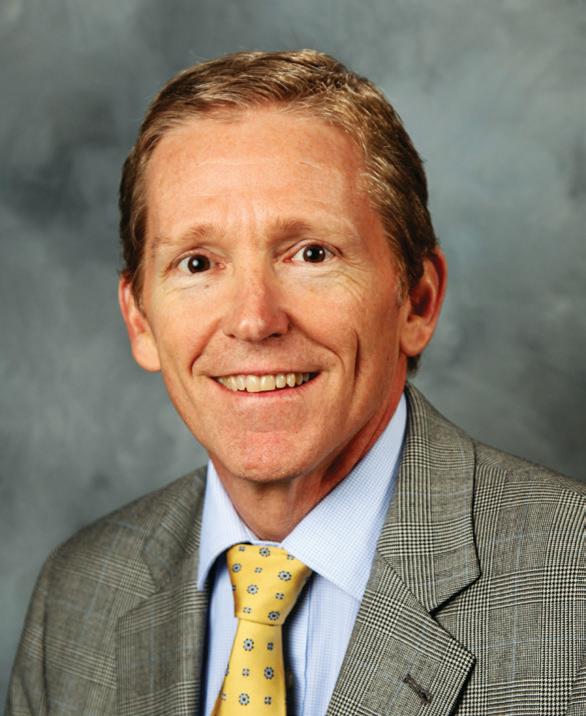
DEKE NEWS
Oklahoma Deke Leads the Tin Can Sailors
Garcia Menocal, one of seven Dekes who have served as national presidents.
Loving the Monthly Grind in New Media
Another Deke has reached the top. Early last year, Tin Can Sailors, a non-profit association of 10,000 veteran U.S. Navy destroyer sailors, elected Terry Miller, Rho Lambda ’69, as the group’s president. During his first months at the helm, Brother Miller worked to orchestrate a merger with the 1,500-member Cruiser Sailors Association, but those plans were scuttled in November.
From its headquarters in Somerset, Mass., Tin Can Sailors has helped secure $2.5 million in project grants to help preserve ten navy ships and their history. The group also maintains a library there of over 8,000 books on U.S. Naval history.

It sits across the Taunton River from Battleship Cove Museum, which contains the largest collection of World War II ships including destroyers, a submarine, two PT boats, and a soviet missile corvette.
Brother Miller sailed aboard the USS George K. Mackenzie (DD-836) out of Yokosuka, Japan from 1968 to 1970, with many of Miller’s missions occurring off the coast of North Vietnam. During WW II and the Korean War, the destroyer provided antisubmarine screening and battleship and carrier support duties. It was retired in 1976.
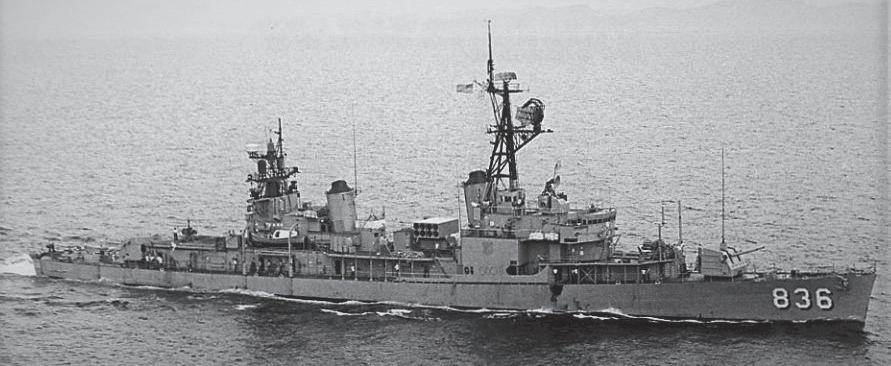
Brother Miller is a historian, researcher and long-time newspaper man who wrote for a small-town Texas weekly before it succumbed to the realities of print media today. He has contributed to every issue of Tin Can Sailors’ magazine since 2002 and recently began contributing to the Deke Quarterly. In last summer’s issue, he wrote about two Dekes vying for the Republican presidential nomination of 1886. In this issue, check out his story about Delta Chi Deke and Cuban president Mario
Since departing Bloomsburg University with a degree in English and a masters in instructional technologies, Shawn Rosler, Chi Rho ’00, has pursued a meandering career with many stops, all at the intersection of teaching and digital media. He’s been an adjunct professor at Bloomsburg since 2017, but his favorite gig to date? Host of the nation’s first culinary podcast, Coarse Grind, which he launched in 2014.
More than eight years on, Brother Rosler approaches his 200th episode. In shows of
gives a view of Rosler’s penchant for subjective, almost fan boy exaggeration or just plain crazy content. “I only want to have fun and share interviews that tell the backstory of the best chefs in the country. I’m looking for real life, to hear the ideas that got the chefs to where they are, and the unpredictable nature of the biz.”
Notable guests have been Christopher Kimball of America’s Test Kitchen; Steven Raichlen, of Barbecue University; and Art Smith, Oprah Winfrey’s longtime personal chef. Others have been Bravo TV’s Top Chef alums Ilan Hall, Dakota Weiss and Laura Cole. Cole, former chef at Denali National Park, told of having to pull a sled through temps of -50F to get ingredients into the kitchen at Amundsen-Scott research station at the South Pole.
Ilan Hall won the second season of Top Chef, and Weiss is executive chef for Los Angeles’ luxury hotel W.
30 to 60 minutes, Rosler airs opinions – his own and those of expert chefs, cutting a wide swath of topics from music to bartending, along with tales spun by chefs about their culinary art.
Coarse Grind’s subtitle, “gonzo culinary podcast,”
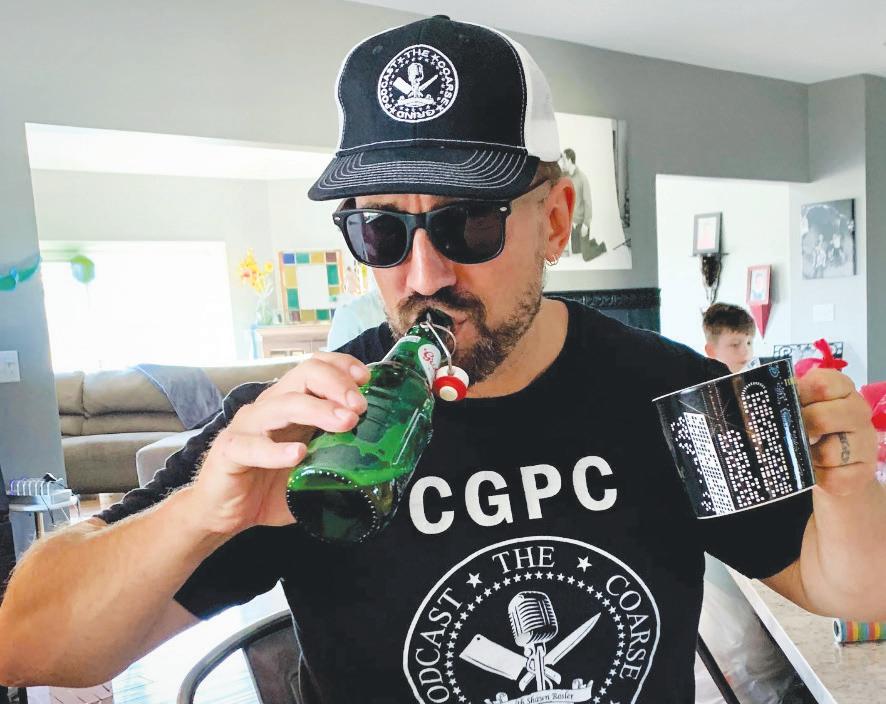
Drop in to see current or past podcasts on his YouTube Channel, here, or on Facebook @CoarseGrindPodcast.
Five years ago, after completing his 50th podcast, Rosler said he wasn’t quitting his day job anytime soon. Here we are in 2023, and he still hangs on to his better paying
pursuits. Meantime, he’s loving every bit of the monthly grind and sharing crazy times with this wife, Greta, and three sons.
a semester off for various reasons.
With several chapter expansions underway and spring recruitment just ahead, DKE appears poised to pass the 3,000-member mark for the first time by the end of the academic year. For historical comparison, DKE had 1,161 members in fall 2012 and 1,993 members in pre-Covid fall 2019.
DKE Membership Is On the Rise
DKE is enjoying some solid post-pandemic growth, according to Turner Spears, Director of Administrative Services. The current active membership role, at the close of fall 2022 recruitments, was near 2,700 undergraduates. That total reflects a low inactive rate—when members take
The growth is significant as operations are improved when chapters are competitively sized for their campuses, Spears notes. Strength in numbers provides greater purchasing power in housing, for hosting successful events, or simply to avoid the fear of extinction with each pledge class.
“From a strategic level, a beefed up DKE could be beneficial in weathering the predicted college enrollment
Expansion Notes: DKE Returns to West Point, Works With Other Interest Groups
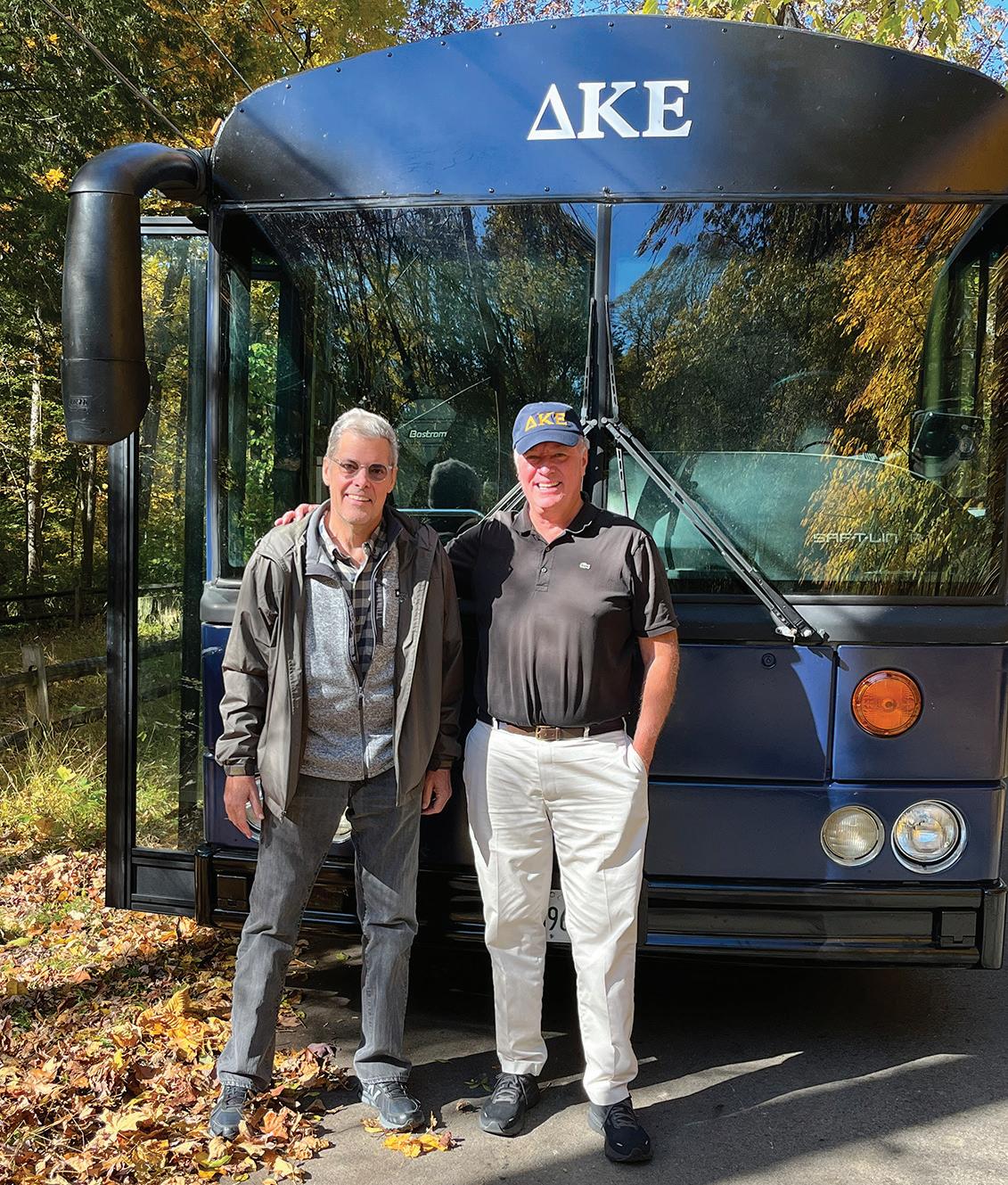
slump that is projected to span five or six years,” says Turner. “From HQs perspective, stronger membership allows us to roll out more and improved services to chapters – like a stronger chapter consultant program, better online tools for chapter management, larger conventions, and networking initiatives.”
A Weekend to Remember at Lambda-Kenyon
The alumni reunion at Kenyon College on a spectacular fall weekend in late October drew an exceptionally good crowd – a couple dozen alums returning to the
Delta Kappa Epsilon’s expansion of the past couple of years continues in a positive direction. The latest growth comes from a return to West Point. The DKE Board of Directors approved an interest group of 30 men as an Associate Chapter in November.
DKE had a chapter, Alpha Gamma, operating at the U.S. Military Academy in the early 2000s and a colony that faded out in 2018. The Academy does not recognize fraternities, but it doesn’t seem to keep them from forming. Students are grouped into different corps at West Point, and our interest group hopes that the fraternity will enable them to more easily socialize with men from different corps.
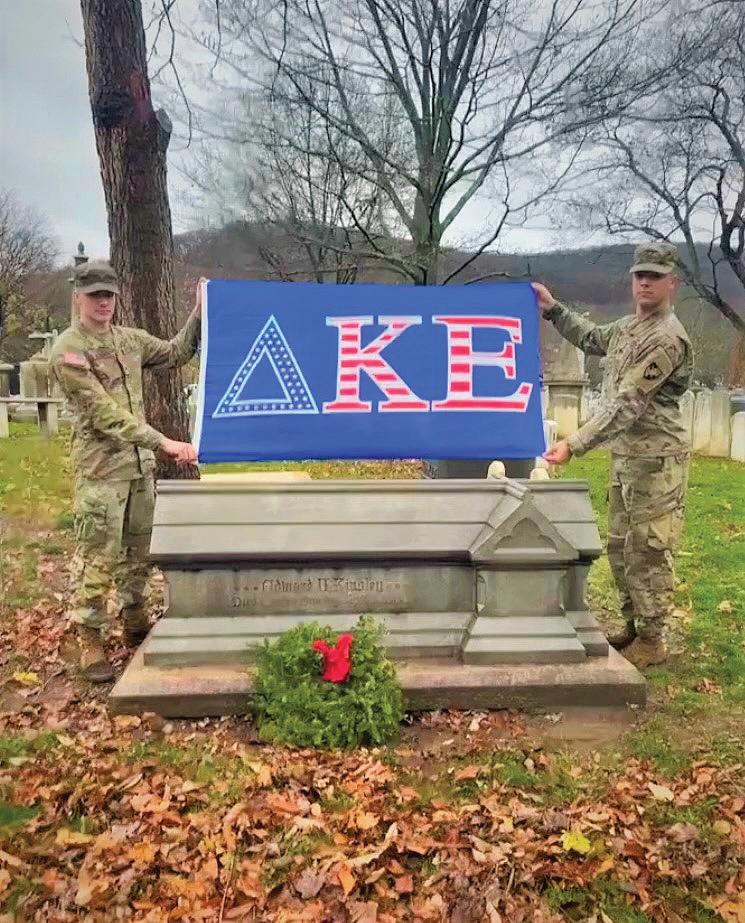
Cadets of the new Associate Chapter, Timothy Clements, ’24, and Ryan Santoro, ’23, are pictured in a visit to the West Point cemetery on December 4. They paid respects to DKE founder Edward Van Schoonhoven Kinsley, who’s buried there, as is another Deke, John Biddle, Omicron chapter, who served as the Academy’s Superintendent during WWI.
Morgan McElroy, assistant director of chapter services, notes that DKE is teeming with expansion opportunities this spring – with interest groups at Villanova and Central Michigan, as well as getting the green light for chapter slots at Oklahoma State and Penn State.
beautiful campus in Gambier, Ohio, barely outnumbering a passionate group of 22 active brothers. DKE Executive Director Doug Lanpher presented the Delta Award to the full chapter. Lambda had been named most improved chapter at the DKE Convention in Charlotte last summer -- but it is always special to bring it
Exciting opportunities are also in the works for possible expansion beginning next fall at University of Delaware and Indiana University and, following that, exploring potential for chapters next year at Cal-Irvine, Maryland, San Diego State, Tulane, and Union College.
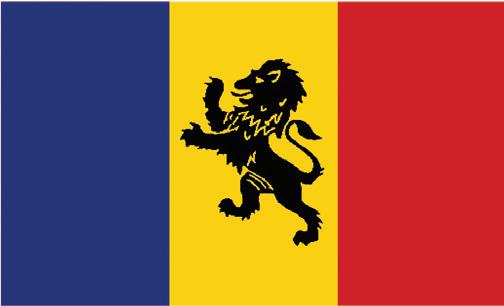
home and deliver it to the full complement of brothers who earned the award.
The hit of alumni weekend was “The Lambda Express,” a school bus that A.J. House, ’80, had converted into an RV. Brother House and co-pilot Jeff Spear ‘78 drove the Express to Gambier from west central Illinois for the festivities.
As is always the case, this alumni weekend witnessed guys who were great friends in college reuniting, in some cases for the first time in decades, but quick to rekindle the friendship formed years before.
The Lodge, on the site of the first structure in North America ever built in North America exclusively for fraternity use, is in the best shape it has been in decades. Members built the lodge in 1854, after the college removed its ban against fraternities and even supplied the land and lumber.
DKE Chapters Raise $22K for Movember
Each year, Delta Kappa Epsilon fraternity participates in a month of philanthropy fundraising that benefits the Movember Foundation, a leader in men’s health awareness, especially mental health, prostate cancer, and testicular
cancer. From November through early December, 16 DKE chapters collectively raised just shy of $22,000 for the 2022 “Challenge.” That total meant DKE’s fundraising over two years reached more than $58,000 for men’s health.
This year’s top earning chapters were Nu Alpha-Northeastern ($4,200), Tau Alpha-McGill ($3,000), Phi Epsilon-Minnesota ($2,400), and Alpha Phi-Toronto ($1,900).
Imagine this handsome Deke with facial hair! One of Nu Alpha-Northeastern’s newest members, Christopher Wilk, was the true Movember Man; he was the top individual fundraiser this past fall among all DKE chapters.
Grave of Psi Founder and Gold Rush ’49er Refurbished
Psi-Alabama chapter alums recently located the grave of Cyprian George Webster, Phi-Yale, class of 1848. Brother Webster, buried in Mobile, Ala., graduated from Yale a few years after our fifteen Delta Kappa Epsilon founding fathers. He was considered “the most influential of active Dekes” at the time, per a history in the 1910 Catalog, especially
Chris Rice Inducted into Beta Chapter’s 1851 Society
DKE’s Beta alums have inducted Chris Rice, ’94, into the chapter’s top honorary society for alumni, The 1851 Society. The society is named for the year Beta was established on the University of North Carolina campus in Chapel Hill.


Brother Rice joins 13 others who have been inducted since the society’s inception in 2009. Members have provided valuable and dedicated service to Beta for an extended period of time.
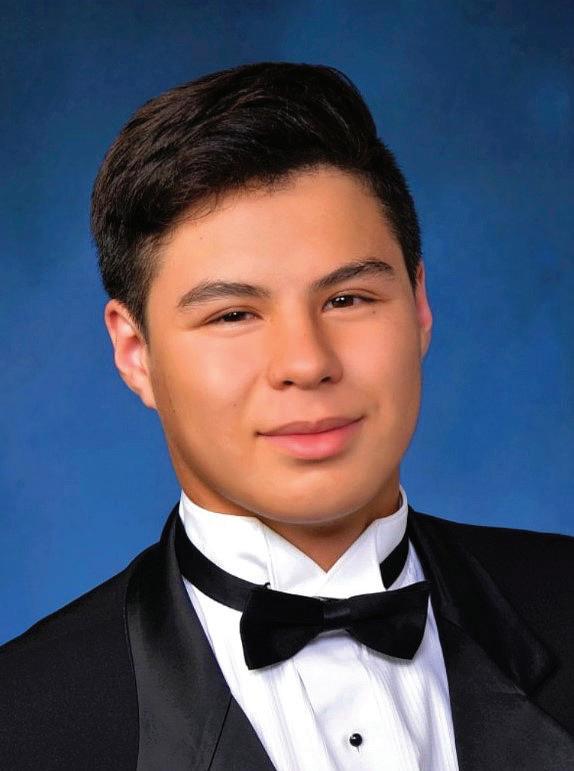
“Chris Rice is the kind of Deke alumnus who has sustained us over all these long years,” says Jim Gray, ’70, who administers the society for the chapter. “We were the first fraternity at Chapel Hill, and we remain the best.”
There were no 1851 Society awards given in Covid year 2021. However, the society
Members did vote in 2021 to name longtime house manager Meg Miller an honorary member; she was recognized in the 2022 ceremony, on Saturday, Oct. 29.
Rice and Miler were made members at a ceremony on the iconic red stairs at the DKE House. Family members and pledge brothers spoke about Brother Rice’s long service to the chapter. Rice and Miller received pins and certificates, and their names will be added to the permanent brass plaque in the Beta bar.
DEKE NEWS
Psi Brothers gathered last June at Psi founder’s newly cleaned grave marker in Magnolia Cemetery in Mobile, Ala., left to right: Duggan Ellis ’82, John Nielsen ’83, Black Chaffe ’83, John Calhoun ’82, Semmes Favrot ’82, and and Rob “Catfish” Clark ’83.
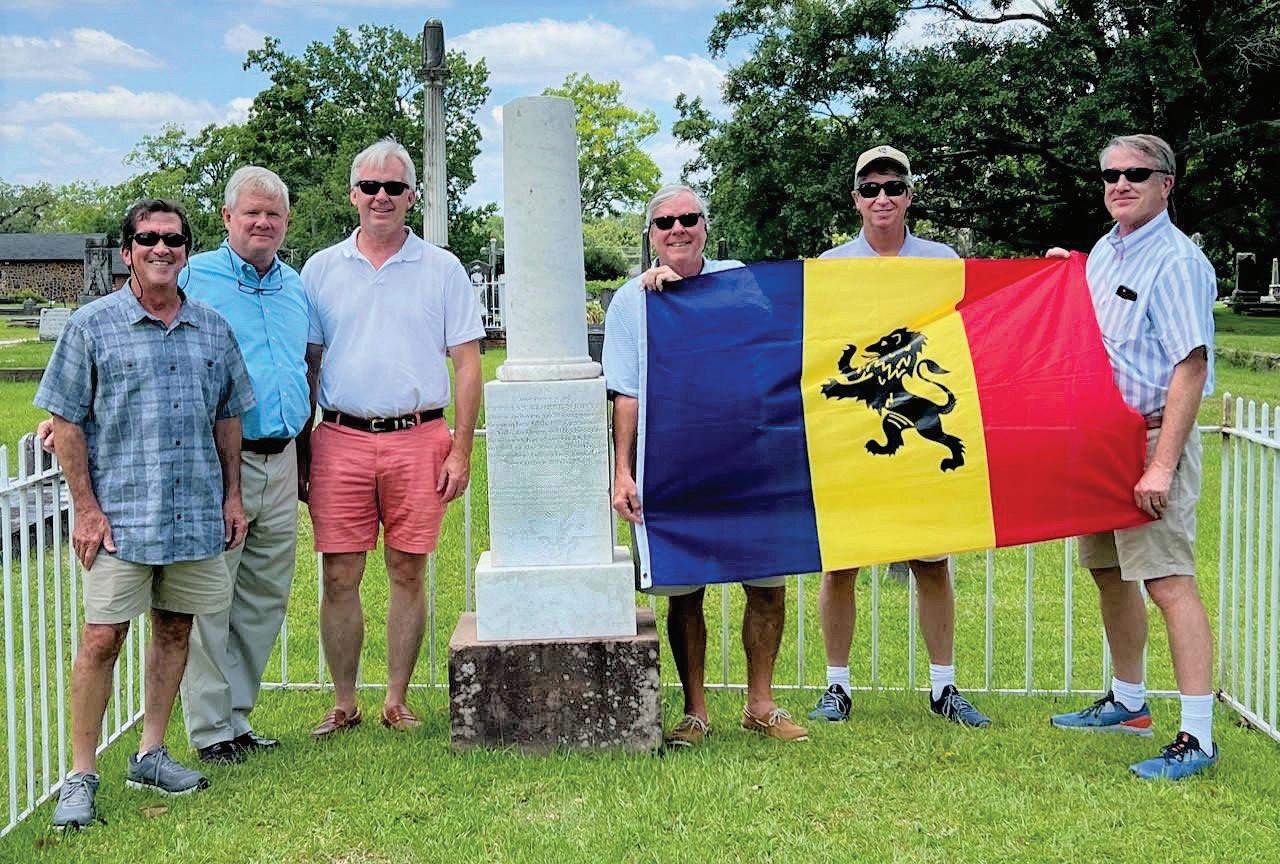
for his work cultivating the fraternity’s early prestige and its continued development.
Brother Webster was the primary author of DKE’s first constitution, is honored as the founder of the Psi Chapter, and was instrumental in the push to develop the southern wing of DKE chapters.
Before settling into a law career after Yale, Webster and several of his Yale compatriots headed to California to take part in the great gold rush of 1849. Brother Webster thus became a genuine “49’er.” The experience extracted the ultimate toll. Webster returned home ‘a wreck’ – and died of consumption in 1850 at age 25, preventing him from seeing the birth of four Southern DKE chapters he had helped create.
At Yale, Webster was President of the Calliopean Society (a Yale literary and debating society), Class Orator, and Commencement Speaker.
Brother Webster was descended from John B. Webster, who was a colonial governor of Connecticut. The founder
of Psi was also a cousin to a long list of famous Americans; they include Rutherford B. Hayes, George H. W. Bush, and George W. Bush – three Dekes who would serve as U.S. President – as well as Noah Webster, of dictionary fame, singer Janis Joplin, TV personality Johnny Carson, author William Faulkner, poet Emily
Dickinson and actress Katharine Hepburn.
The Deke Quarterly Turns 140
The Delta Quarterly was born 140 years ago this month. First edition of January 12, 1883, edited by Whitelaw Reid, who also worked for the New York Tribune, con-
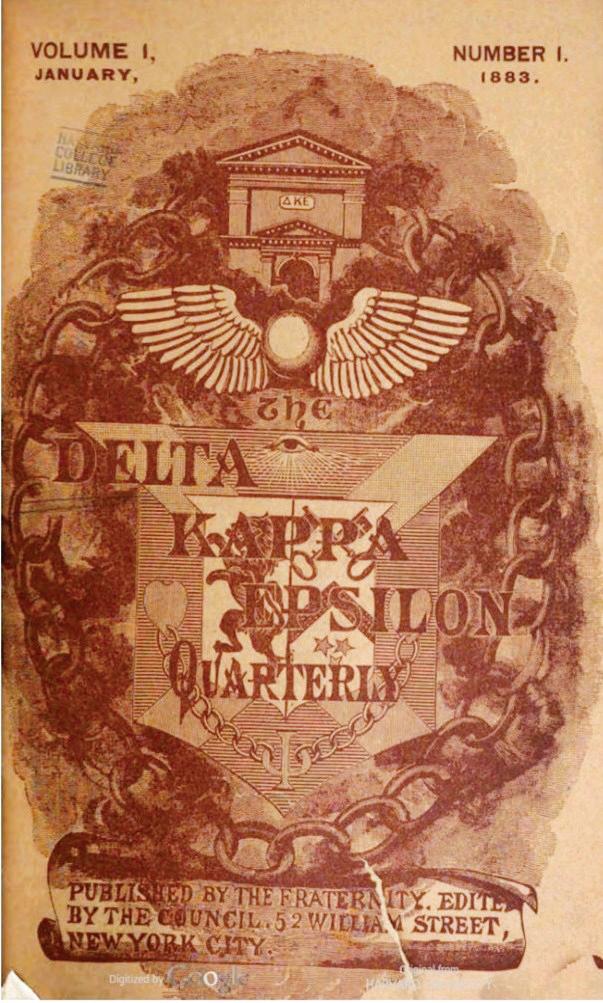
Deke Trivia: Did You Know?
. . . that a Deke is credited with laying the foundation for the field of brain surgery. Harvey Cushing (Phi-Yale 1891) is considered the father of modern Neurosurgery, having developed or introduced to North America many techniques for brain and nervous system operations, including local anesthetics, the tourniquet, oxygen level monitoring, and a non-invasive way to measure blood pressure. His most famous discovery, “Cushing’s Disease” is caused by a malfunction of the pituitary gland. Brother Cushing was also an author who received the Pulitzer Prize in 1926 for the biography of Sir William Osler. The U.S. Postal Service issued a 45-cent postage stamp in Cushing’s honor in June 1988, part of the Great American series.
tained “a full page vignette in colors of the arms of our fraternity as revised by the last convention … the poem “Our Escutcheon”, contributed by an old graduate… a full account of the proceedings of the last Convention, so far as proper to be published … and Chapter Letters giving full account of condition and doings of each with notes of triumphs etc. for year past. [This latter inclusion was a first of any in the Fraternity world.]
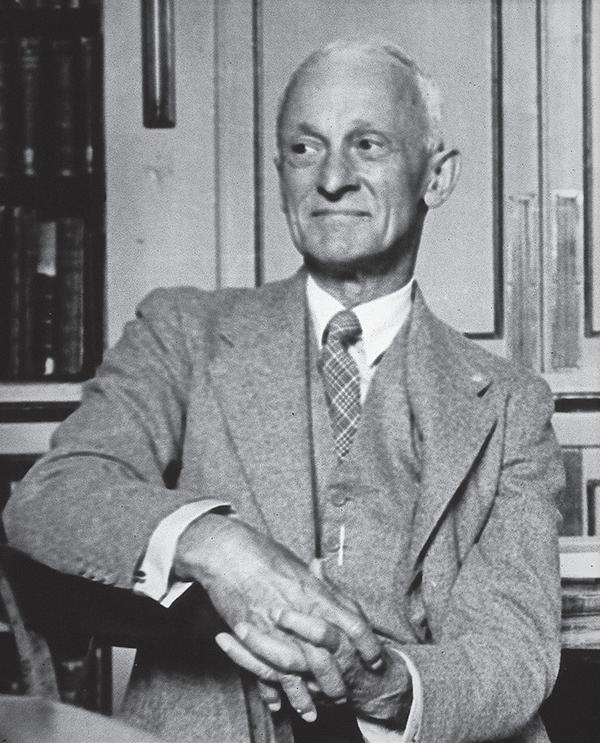
CHAPTER NEWS
Alpha GammaU.S. Military Academy.
Timothy Clements, recently elected president of the new associate chapter, reports: The brothers at the Alpha Gamma Chapter at the United States Military Academy have made great strides in restarting the chapter. We have already rostered 41 brothers in the less than two months since restarting the chapter. We have set a recruiting goal of 30 brothers in each graduation year.
We hope to continue our successful recruitment season by highlighting the excellence of the brothers in our chapter and the alumni network of service to our nation that will be set up if we continue to maintain a notable size.
We have established our culture and promoted leadership within the Corps of Cadets for our Brothers. Alpha Gamma members have already taken on roles of leadership at the academy, several serving as Cadet Platoon and Cadet First Sergeants and hundreds of cadets in their chains of command.
We hope to show DKE International and the USMA administration that the brothers in our chapter set a standard above the average USMA cadet – which is already set very high. Our current GPA is 3.27, nearly 0.3 higher than the corps as a whole.
DKE and USMA both have long histories of excellence and service and the parallels
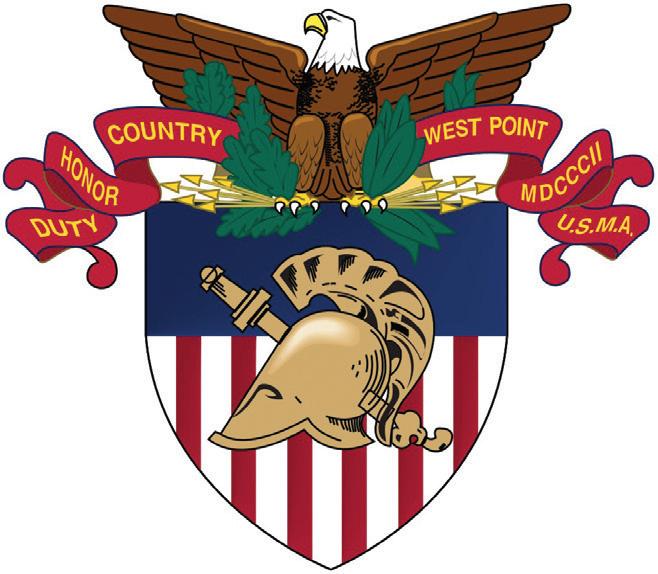
between the mission statements of both institutions were the deciding factor in choosing to restart a chapter of DKE here. We believe the success of DKE at USMA highlights both the character of the Corps of Cadets as a whole and that of the larger DKE organization. GO ARMY!
Beta Tau-Victoria and Tau Beta-Simon Fraser
Dekes visit Dekes! The DKE HQ staff highly encourages chapters to visit other chapters and Canadian chapters Beta Tau and Tau Beta have blazed a bright trail in response. Here are photos from three chapter-chapter rendezvous in September.
In the photo below left, Beta Tau members are visiting
Tau Beta chapter at Simon Fraser. Appearing horizontally is Brother Beta Reeve Henderson; behind him, l to r, are Keigan Claus, Shawn Batti, Ethan McCullagh, Matt Darmohray, Daniel Wheaton, Colby McAusland, and Joey Cohn. In the photo (above right), Beta Tau men slipped into the U.S. to visit our new Kappa Epsilon chapter at University of Washington; pictured in presidential purple is the elite entourage of current president Henderson; Tom Howard, 20/21 president; Evan Guildford, 21/22 president; and Evan’s younger brother, Alex Guildford.
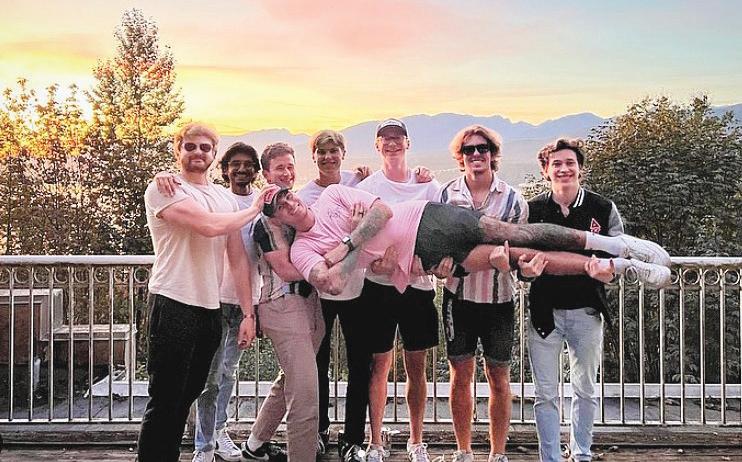
The accompanying pic was taken by Tau Beta Dekes the final week in September, moments before 25 rushees arrived for the last gathering of Open Rush on the Simon Fraser University campus. Front man here, Kyle Tadeo, soon helped president Jon-
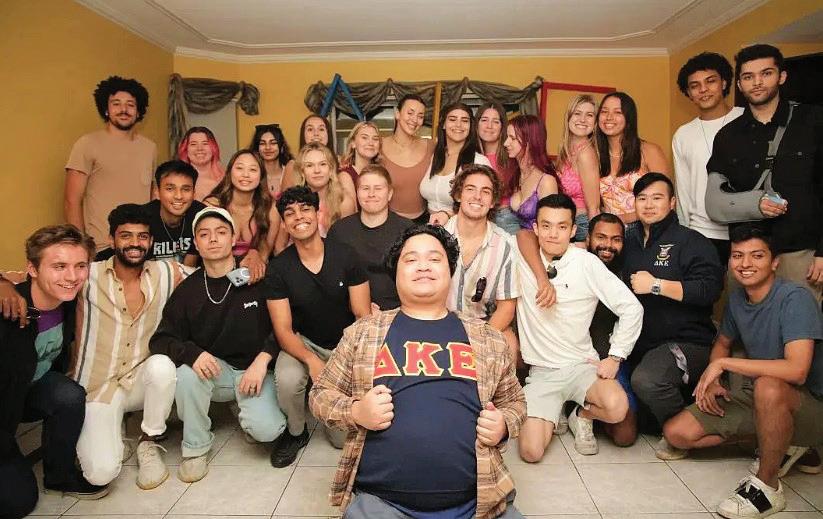
athen Eng launch the party that Tau Beta hosted and welcomed Dekes visiting from UVic as well as Kappa Beta Gamma sorority women from both UVic and SFU.
Lambda-Kenyon.
Chapter members were thrilled with taking home some special hardware from the DKE Convention in Charlotte last summer – and posted about it on Lambda’s social media pages when they arrived on campus for the fall semester. “We took home multiple awards—first, as most improved chapter. Here at Kenyon, we went from borderline extinction (having to recover from sanctions imposed on us in 2018-2019) to a thriving and passionate group of 22 active members.”
Another honor at convention was awarded to Andrew Kotler ’22, who won the Napolitano Award for most outstanding chapter president. Andrew led the way for the Lambda chapter to experience such growth over the past year with his dedication and love for the brotherhood.
Special thanks to Aymeric Mauvais ’25, Reily Scott ’25, and Andrew Kotler ’22 for representing the Lambda chapter at the convention.
The fall semester also saw Lambda pick up steam in operations, including a strong return to philanthropy
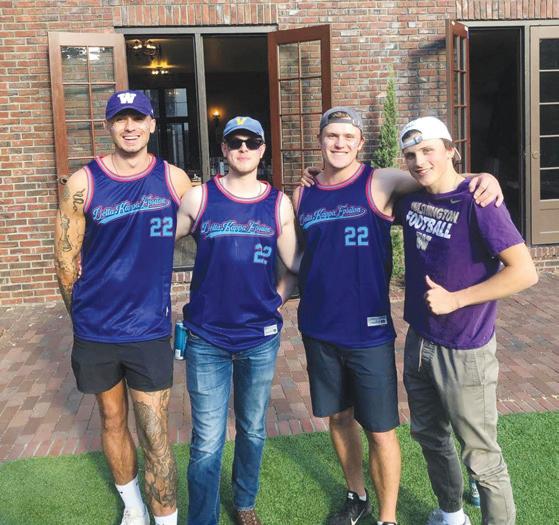
CHAPTER NEWS
an annual fundraiser.
The brothers of Delta Kappa Epsilon at Kenyon have hosted the Shawn Kelly Memorial Holiday Party every December since 1991 to raise money for Knox County Head Start, a local program with several centers throughout the county that provides child care, early education and health services for children. The memorial honors a DKE and record-setting swimmer who passed away during his freshman year in 1990 in a boating accident.
Brother Muslmani at right.
We hosted our 2nd Annual “Movember Madness Week” just before Thanksgiving, wrapping up our fall philanthropy with several events to benefit the Movember Foundation. We held Donuts with DKE, as well as our CopaDKE 6v6 soccer tournament, each contributing cash to raise awareness about Men’s Health. A special cheer of congrats to our soccer tournament champs, Chi Omega.
and community service. In early November, our chapter co-hosted with Theta Delta Phi sorority a charity 3K turkey trot along part of the Gap Trail, which runs along the Kokosing River and railroad right-of-way through Gambier, Ohio. The trot was open to community members as well as students and drew in 100 registered participants, raising $1,000 for the Shawn Kelly Holiday Party. The annual Shawn Kelly holiday celebration is a fundraiser for underprivileged children in Knox County. It was one of a few events we partner with the sorority which all contribute to the Shawn Kelly fund.
Chapter president Dylan Osimetha, ’23, was quoted in the Kenyon Collegian campus newspaper acknowledging the Turkey Trot’s success at fostering a stronger sense of community. “Anytime you can get the whole community involved in an activity, I think it’s really a huge boost to building our relationships across campus,” he said. He also notes that DKE hopes to work with Theta to make the Turkey Trot
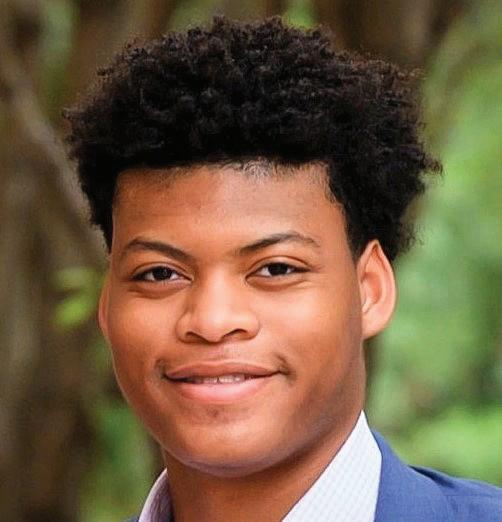
Omega OmegaArizona
The jolly good fellows of DKE at University of Arizona were honored recently as “Most Diverse Chapter” by the university’s lFC – the first time the award has been presented.
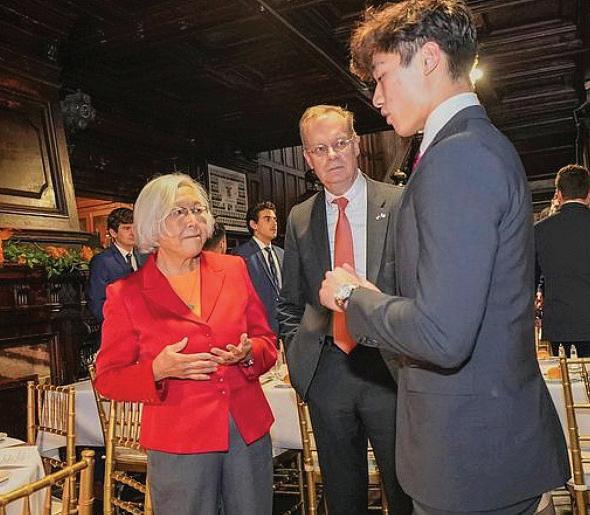
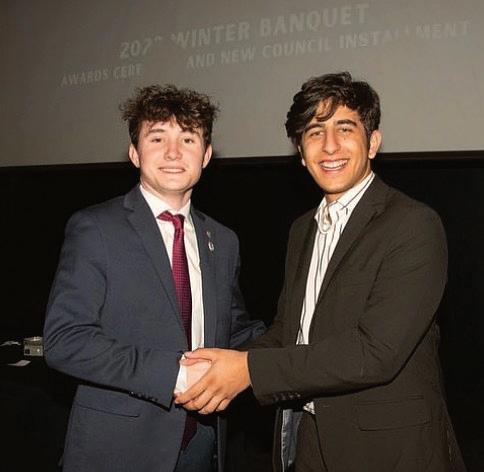
Sami Muslmani, our chapter’s previous Brother Beta had also held an officer position in the IFC, as VP of Programming. This year, current Brother Beta Ethan Woodard was elected to succeed him in the same IFC post for the new year – beginning in January. Woodard notes it is “great to have two Dekes on the IFC for back-to-back terms.” The photo
left and
Operations have been strengthening since the chapter earned its charter a few years ago, with recruiting improving in each semester. Omega Omega began the 2022-23 academic year with 45 active members and added a 30-man new member class in the fall, one of DKE’s top growth performers.
The chapter picked up where it left off, continuing to do a great job in philanthropy. Among the long-time successful events is Spike It!, a 6v6 tournament that raises funds for Upstate Foundation and the fight against pediatric cancer.
Phi Gamma-Syracuse.
In October, Phi Gamma chapter continued a long and great tradition, welcoming Chancellor Kent Syverud and his wife, along with Fraternity and Sorority Affairs staff to the Deke house for the annual Chancellor’s Dinner. On hand for the festivities was DKE Executive Director Doug Lanpher, who also presented the Lion Trophy to the chapter, which had been announced as the winner at the summer DKE Convention in Charlotte.
The chapter also had a new cause to celebrate recently, when Phi Gamma brother Pedro Mayer, who serves as head manager of the Syracuse Orange men’s soccer team, traveled in mid-December to Cary, N.C. There, the team won the school’s first NCAA Division I soccer title. In the photo, Pedro (at left) shares joy of grasping the national champion trophy with his good friend and team captain Noah Singlemann.
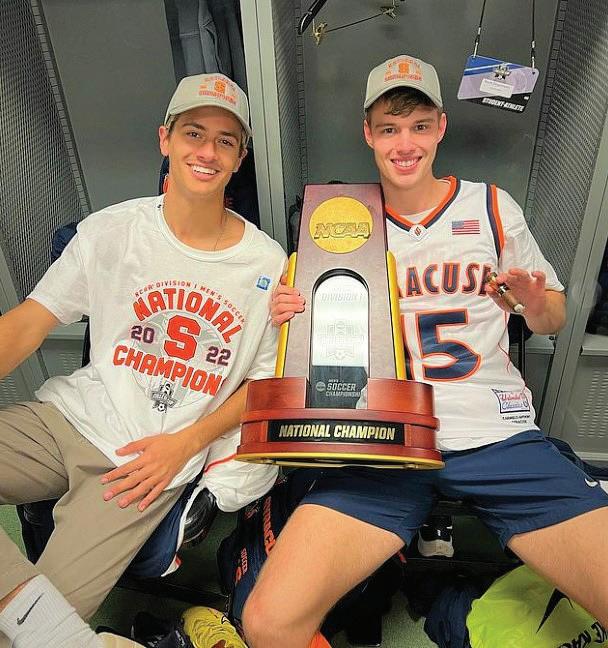
Psi Omega- Rensselaer Polytechnic Institute.
Brother Beta Jacob Edwards reports: We started the fall 2022 semester with a series of difficult recruiting and financial scenarios. One of our brothers had betrayed us (and has since been de-brothered) and we were left in a financial pit. We entered the semester with just 12 active brothers: two graduate students, three seniors, and seven sophomores.
One of our strongest recruitment strategies beginning in fall 2021 was playing volleyball on Freshman Hill, a hill on the RPI campus surrounded by several freshman dorms. We invited students walking by to join us. One time, we had over 40 people playing volleyball on two nets. The effort helped us grow from nine members to 22 members that semester.
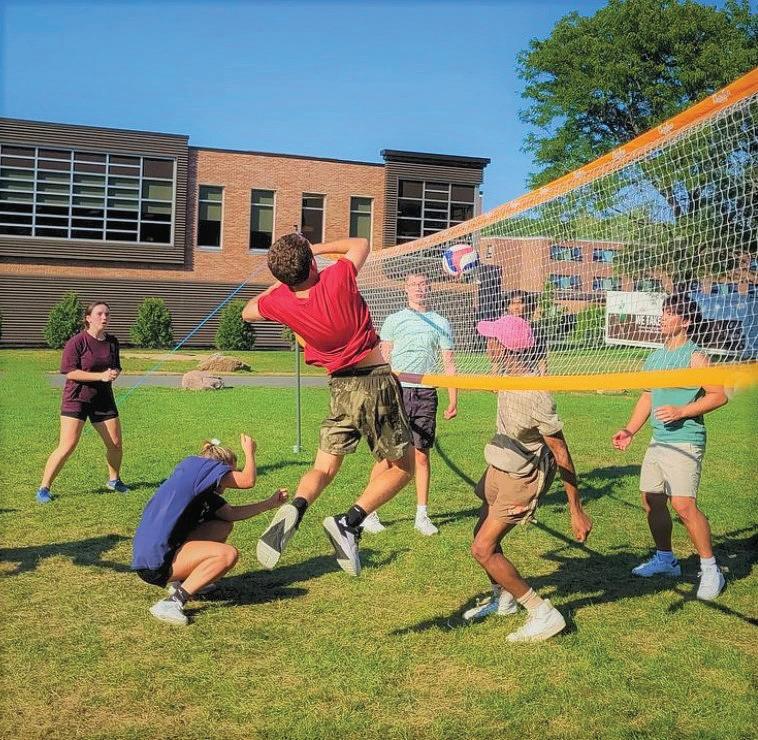
Psi Omega has also devised other rush events to strengthen our recruitment. Besides volleyball, the events included Laser Tag, Chicken Joe Nugget Night, Bowling at Uncle Sam’s, Volunteering at the Food Bank, and Mac’n’Milkshakes. The latter, a new event in fall 2021 that attracted fewer than 10 potential new members (pnms) that year gained some steam and attracted more than 50 pnms at the start of fall 2022 rush. We carried this momentum throughout rush as we shaped our events around the people we liked. We concluded fall rush by extending 24 bids and getting acceptance from 12 new members – doubling our brotherhood from 12 to 24.
A key financial issue has been our inability to afford to pay the $450 initiation fee for each new member. Psi Omega has tried to continue a common practice at RPI of not charging dues to new members. We called on our
limited alumni base for support for this cause, and although we have limited alumni pool to draw from (after a 50-year gap in our membership from inactive years), the alums responded phenomenally well. In fact, they responded unlike anything we’ve seen before. In less than two days, we raised enough to cover the new member class and more!
Psi Omega kept its philanthropic efforts steady through the fall. We added a new philanthropic event for Halloween, teaming up with Circle K, an international collegiate service organization that focuses on developing leadership skills of its members. We helped Circle K run a haunted house, scaring tour groups with spooky noises as they walked through our section. That event raised over $6,000 for the American Cancer Society.
In November, we conducted our staple philanthropy event, DKE Diner, where we take orders for night delivery between 9 p.m. and midnight, typically timed during exam periods while most students study late into the night. This year, we chose to sponsor a new organization, Alana for Allergies, a nonprofit that memorializes Alana Uy Tow by sponsoring allergy research. Alana was a sophomore at RPI who died in a fatal accident in September.
Many of our brothers knew her personally, so it was unani-
mously decided to run DKE Diner in her honor. We raised over $400 for DKE’s Diner, the most ever for that event.
Phi Mu-Manhattan.
The chapter in the city is confident in its DKE character. Indeed, members proudly reported on its social media pages: “No matter what it is … Dekes do it better.” And, true to their words, Phi Mu supported the bravado by reporting that (1) four brothers had been inducted into Manhattan College’s honorary scholastic society Epsilon Sigma Pi, which requires a cumulative, sustained GPA of 3.5 or higher; (2) the chapter repeated as volleyball intramural league champs, and (3) hosted an inaugural charity softball game that drew crowds to rival the school’s varsity game turnout. That success has Phi Mu planning to establish an annual charity softball game.
Phi Mu has shown strong innovation in its community service as well. It recently
helped secure a place in the neighborhood for a refugee family from Afghanistan. This spring semester, Phi Mu gentlemen are seeking to replicate that success by finding a new home for a Ukranian Refugee Family.
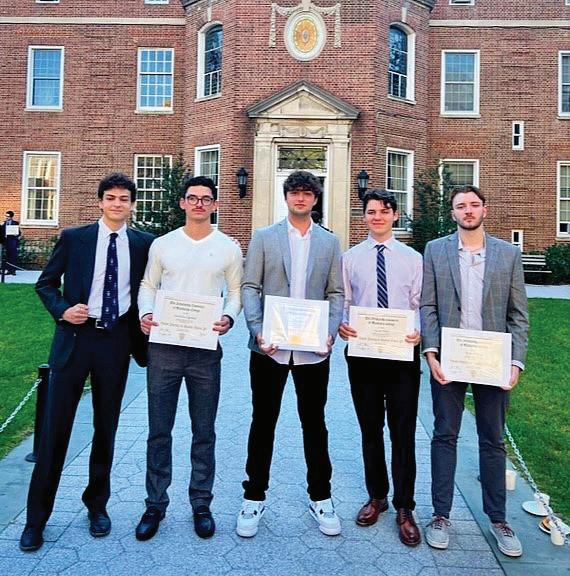
In more traditional philanthropy, Phi Mu continued its participation in an annual Walk for Cancer in New York’s Central Park. It also raised additional funds for fighting cancer this past fall semester, with HarvestFest 2022.
“It’s a tradition we’ve had for a while now, says former Philanthropy Chair and newly elected Brother Beta, Joseph Talenti. “We keep growing our efforts each year, and this time out, we raised some big bucks for the American Cancer Society.
Phi Mu’s Rampant Lions repeated as campus intramural champs in volleyball, led by senior Diego Lojano ’23 (top left, white t-shirt flexing); Brother Lojano was on the Ecuadorian National Team Sub 2001 and the USA Youth National Team A1. Crouching at front: Griffin Reische and Andrew Kulp; Pat Brennan (gray sweatshirt), Luis Olano (green tank top), Voshon Alexandre (black sweatshirt), Juan Posada (red t-shirt), and Kevin Corcoran (white tank top).
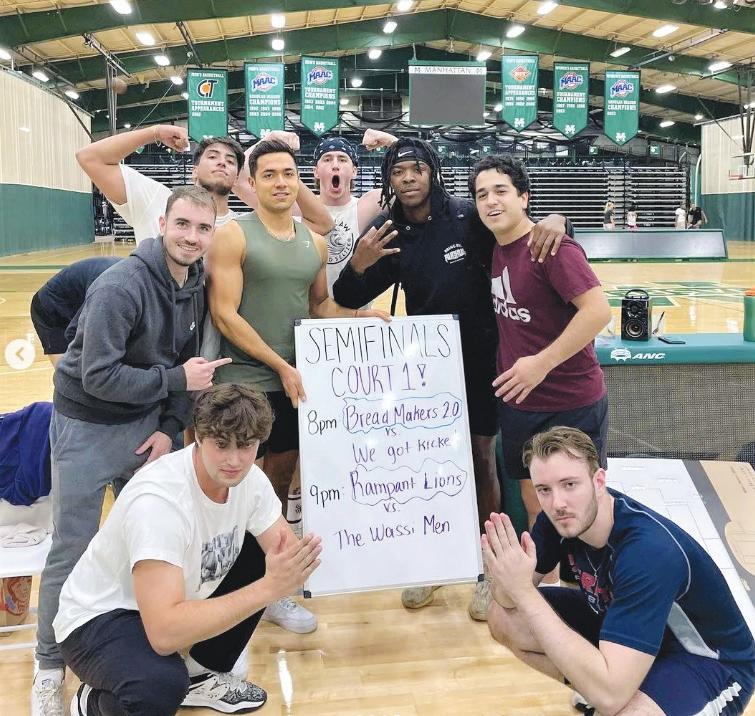
A TALE OF TWO HOUSES
Some of the most cherished memories of Dekes spring from moments shared in our chapter houses – where we first learn of brotherhood, where we embrace to celebrate good times, or where we lean on each other to get through tough times. The houses are where we forge friendships destined to be lifelong. We clean, paint, saw, and nail things together in our houses—becoming stewards of places we open to alumni, parents, friends and visitors. Be they grand mansions, modest residences, or even a cluster of off-campus apartments – the common denominator is that Deke houses should be warm, welcoming places. The following are tales of two 90-year-old chapter houses recently turned back into appropriate homes for gentlemen, scholars, and jolly good fellows.
Deke House at Washington Gets a Makeover
BY DANIEL HELDRING, KAPPA EPSILON ’99The chapter house occupied by Kappa Epsilon Dekes and owned by the Puget Sound Association of Delta Kappa Epsilon (PSA of DKE) is a beautiful four-story brick building centrally located in the University of Washington Greek system.
The house was designed by two UW architecture professors in 1928, built in 1929 and according to a third emeritus professor is “wonderfully served by its bricked-in entry courtyard (and) the handsome front doorway.” Upon entering the chapter house, one will be standing in the grand foyer. To the left is the spacious living room anchored by a chandelier that complements the wood ceiling. Beyond the living room is the library, a cozy room perfect for studying or holding meetings, and the President’s Suite, the living quarters for Brother Beta.
To the right of the foyer is the dining room, where the Deke crest is painted on the wall above the fireplace, and the fullservice kitchen. Straight ahead are stairs to the bedrooms on the second and third floors. In the basement there is a social room, two additional bedrooms, and laundry facilities. There is a chapter room, but its location must not be shared lest this article be read by someone not initiated into the Deke brotherhood.
In the summer of 2020, PSA of DKE embarked on extensive renovations to the chapter house, primarily its interior. The story of these renovations is best told with an understanding of the history of the Kappa Epsilon chapter from the 1960s on.
In 1965, PSA of DKE closed the Kappa Epsilon chapter due to declining membership, a consequence of rules violations, antisocial conduct, and underwhelming academic achievement. In 1975, they sold the chapter house (the house needed significant repairs and there was a strong anti-fraternity sentiment at the time). In 1991, with the help from Phi Alpha Dekes, PSA of DKE reactivated the Kappa Epsilon chapter. In 1993, they purchased the property that is today the Kappa Epsilon chapter house. Kappa Epsilon again became a thriving
chapter, twice winning the Lion Trophy award. Fortunes changed because of the mistreatment of associate members during the 1997-1998 school year. The University of Washington, following its investigation, cancelled the chapter’s recognition, which made it difficult to sustain membership. In 2004, PSA of DKE decided to close the chapter and lease the property to a different fraternity.
During the years that PSA of DKE leased the chapter house, capital improvements focused on the exterior of the building. It was decided to hold off on major interior renovations (except when circumstances necessitated immediate action) until after the tenants vacated the property.
The PSA of DKE Board of Directors spent many meetings debating how to pay for the renovations. As one might expect with a building nearly a century old that had endured many years of fraternity activity, the scope of work was both extensive and expensive. PSA of DKE reluctantly decided to sell the property adjacent to the chapter house that it had also purchased in the 1990s.
After completely gutting the property – it is quite sight to walk through a building without walls – we proceeded to:
• Install new wiring, plumbing, sprinkler system, and fire safety equipment.
• Restore the living room and library to possess the grandeur they deserve.
• Reconfigure bedrooms for optimal placement of sturdy beds, closets, and desks.
• Redesign the kitchen and dining room to enhance food operations while also replacing appliances and cabinetry
• Replace the carpeting and flooring throughout the main floor and residential floors.
The chapter house is now a first-class facility with the amenities that a modern fraternity requires.
As one might expect, the renovations had its challenges. The pandemic often made it difficult to find and schedule vendors. Rising costs, particularly for lumber and other materials, necessitated PSA of DKE secure a line of credit. A late December 2021 freeze led to burst pipes; fortunately, the damage was minimal.
Seventeen years after the Kappa Epsilon chapter closed for a second time, the Deke flag once again flies above the chapter house. There is a new generation of Kappa Epsilon Dekes. Alumni can once again congregate at the chapter house to share life updates, reminisce about their days as an active, and, most importantly, connect with the new generation of Kappa Epsilon Dekes.
Renewing the Deke House at University of Minnesota
Founded in October 1889, Phi Epsilon has operated continuously since – an impressive run among fraternity chapters. One constant for the successful chapter has been a place to call home; the brothers moved into their current DKE house in 1930.


The old house began showing its age in recent decades. Most recently, roof leaks, cracking plaster, and crappy bathrooms
were among problems that kept it from competing with other residences around the University of Minnesota campus. Just over a year ago, the chapter couldn’t entice 15 brothers to live in the house for the next academic year.

To change that tally, house owner Northern DKE Alumni Association devised a fast-track multi-year renovation project –committing to getting changes made in time for fall 2022 movein, Rush, and homecoming events.
A wonderful aspect of the renovation projects is that it truly became a team effort. “So many of the Phi Epsilon ‘family’ –actives, alumni, Deke family members – pitched in to make things happen. The shared work created new friendships and

strengthened others,” Northern DKE president Brian Basler says. Staunch support came from alumni spanning several decades, including Fred Webber, ’58, plus longtime past president of the association Brian Cox; and current treasurer Jason Gilbertson.
Leading the charge with management oversight and significant funding was Mark Miller,’80, a successful orthopedic surgeon who has provided the chapter inspirational and financial support over many years – including long-term funding of the Deke Roar Scholarships, which reward the chapter’s top academic performers each year.
Concerned that the guys had to go to campus libraries to study, Brother Miller started with a wish list. “We asked the actives what they wanted in a study room, and what other changes would encourage them to spend more time at the house.”
Besides fresh plaster, paint, and flooring, the new study is modern and comfortable, featuring an interactive whiteboard, internet connections, a printer, ample power outlets, conference table with six chairs, two computer desks, and a couch.
Bathroom facelifts were a clear priority, too – the president’s on the first floor and all on the 2nd and 3rd floors – if Phi Epsilon was to boost its live-in count.
Unusual items the actives wished for: a fence around the property and artificial turf for the front lawn. “It might appear extravagant,” says Brother Basler, “but it greatly improved the appearance and created a super venue for events year ’round,
Clockwise from top left: exterior of the partially renovated 92-year-old chapter house at University of Minnesota; a revamped and DKE-memorabilia adorned lounge and bar area; the living room with new floors and walls; a fall 2022 homecoming crowd enjoys the fenced front yard, now featuring artificial turf.
even in Minnesota’s messy falls and winters. In the middle of fraternity row and right down from the stadium, the place is always alive with activity – and now the DKE’s front yard is the best looking of the bunch.”

Actives, led by president Jaxon Hill, were heavily involved. Tate Machacek, who was doing an internship as a construction manager, helped guide several projects, including vent replacement on the house exterior and building the fence. Cade Nelson joined with Brother Machacek to keep the study room and library projects moving along, working right alongside contractors.
What’s a fraternity house without fine party space? The common areas were improved with two new bars, one a custom-made English style pub bar with a marble top, along with comfortable padded lounge seating. The scene is proudly adorned with a rampant lion, a framed Deke flag, and, of course, a plaque bearing the motto Friends from the Heart-Forever. “It’s now perfect for late night functions, singing songs, camaraderie, storytelling,” says Brother Basler.

There’s still work to do at Phi Epsilon, including new kitchen appliances, radiators, window replacement, tuckpointing of the brickwork, blacktopping the parking lot, and roof and cement porch repairs.
To fund the renovations – completed and yet to come –Northern DKE conducted Phi Epsilon First! a capital campaign chaired by Max Hurst, ’18, and ably advised by Jim Gray, Beta ’70, who also led DKE’s 175th capital campaign. By fall 2022, more than 80 members spanning eight decades had donated more than $450,000 to the cause. Needing a final push to reach its goal, the campaign continues. Connect to this link to donate or to check campaign status.

The improvements brought immediate positive impacts. Phi Epsilon had to hold a lottery this fall to assign rooms, since more than 25 guys wanted in! The refreshed house also helped entice alums to return.
“We had lost momentum, but the pendulum is swinging back,” Brian says. This year’s homecoming attracted brothers who hadn’t been back before . . . and they saw a house and a chapter of leaders they could be proud of.”

MATT AO SIGMA KAPPA ’14

HE BROUGHT ESCAPE ROOMS TO LIFE IN EAST LANSING, THEN MADE A BIG SPLASH IN SILICON VALLEY
His LinkedIn profile highlighted skills in Horse Racing, Basket Weaving and Fire Breathing. Matt Ao laughs, noting he didn’t post those attributes –they were endorsements from colleagues.
“I realized they were funny and might draw some extra attention. One recruiter thought they were real and I didn’t correct the notion.” After all, shouldn’t a software developer have an active imagination?
Basket weaving fiction aside, Matt did weave a rapid rise in the tech world.
Matt turned 30 just last year – but only after launching one of America’s first Escape Rooms, turning around a private-room karaoke business, landing a dream job at Apple Computing, helping start up an online sports app, and benefitting when Spotify bought it out.
“When trying to be the very best, you have to get to Silicon Valley. I applied to all the leading companies, and they all rejected me.” Matt’s GPA was good, but not enough, as he competed against top achievers from the best collegiate computer science programs.
After rejections from western firms, Matt created his own first big break, by searching for the best tech companies in the Midwest. He found, almost in his backyard, a global leader in screen capture and video editing software. At TechSmith for three years, he concentrated on “mastering his craft as a software engineer” and grew more savvy in the tech world, joining professional communities and speaking at conferences.
While in that first job, Matt spent his spare time to start his first business, one inspired by a session in an Escape Room in China during a 2015 trip to see relatives.
“It was a blast, a very immersive experience. I had seen Escape Rooms in flash and web games, but I thought, ‘Wow, I love games and puzzles. I can bring this to the real world.”
Not even a year out of school, Matt became a student again, and a teacher as well. He learned lessons about hiring contractors and dealing with city permits. Since Escape Rooms were new to East Lansing, Matt had to make presentations to several city committees to earn the special use permits for his building.
Matt, who avoided learning his family’s language as a youngster, grew to realize the potential of learning Chinese. So, while at MSU, he minored in it and still regularly studies the language, in hopes it it could open future business opportunities.
“It has already helped me connect better with my family on
annual trips to China, and helped me build my karaoke business,” Matt says. That second business, Nimbus KTV, drew most of its customers from East Asian students in the MSU community.
Matt kept applying for work at Apple through those first years of writing software for TechSmith and operating two businesses, his ESC Room, and a karaoke room catering to East Asian students in the MSU community. Fourth time was the charm; Matt finally landed a job there in 2017.
“Apple helped me peak in my software engineering mastery. It’s still among the best companies in the world to work for. The culture is superb. Being part of their product teams was great for me.”
Strong as the pull of Apple was, it would only hold Matt for a couple years before he had to scratch the entrepreneurial itch. He teamed up with Howard Akumiah, a former pupil of Matt’s computer programming lab at MSU.
Howard kept in touch with Matt after graduation, calling frequently to propose business startup ideas. “It was probably pitch number 20 that arrived at the right time,” Matt says. It followed soon after the 2018 Supreme Court decision that opened up online sports betting.
A group of tech entrepreneurs founded Betty Labs in 2019, with Howard as CEO and Matt as CTO. Its first release was a live gameshow app called Sideline that anyone could play on their cell phones during NFL and NBA games. It fed prediction questions to users, who could win cash by answering enough questions correctly.
Howard and Matt soon found that the social aspects of the platform were as important to users as winning money, especially as the pandemic took hold in early 2020. Social experiences over the internet exploded in popularity and live audio became the hottest feature in apps.
Betty Labs responded with Locker Room, a live audio platform that competed with Twitter Spaces and Clubhouse and had an appeal similar to sports talk radio. In Locker Room, users could ‘browse’ sports broadcasts and hop in anytime to voice their comments. The app drew early interest from Spotify, which bought Betty Labs in early 2021, bringing Matt along as senior engineering manager.
What’s next on Matt’s horizon? He’s open to broadening his universe, looking to identify industries “where folks are sick of crappy software and where modern software can make a serious impact.”
GAMMA DEKE DELIVERS ASSISTANCE TO UKRAINE
RETIRED ATTORNEY DRIVES A DONATED AMBULANCE AND PROVIDES HELP TO CITIZENS THROUGH THE WAR-TORN COUNTRY
 BY MICHAEL E. HILTS, GAMMA ‘76
BY MICHAEL E. HILTS, GAMMA ‘76
y November last year, ten months of incessant Russian missiles and shelling had turned hospitals, schools and private homes across Ukraine into rubble and left the nation’s citizens in desperate need of medical equipment and supplies. The Rotary Club of Staunton, Va., including member Mike Quillen, Gamma ’72, is among many humanitarian volunteers who stepped up last fall to help Ukraine in its time of need. Brock Bierman, head of the Rotary in Staunton, asked Mike, who had just returned from a Gamma chapter reunion in Nashville, if he would go to Ukraine. Mike didn’t hesitate.
BBy November last year, ten months of incessant Russian missiles and shelling had turned hospitals, schools and private homes across Ukraine into rubble and left the nation’s citizens in desperate need of medical equipment and supplies. The Rotary Club of Staunton, Va., including member Mike Quillen, Gamma ’72, is among many humanitarian volunteers who stepped up last fall to help Ukraine in its time of need. Brock Bierman, head of the Rotary in Staunton, asked Mike, who had just returned from a Gamma chapter reunion in Nashville, if he would go to Ukraine. Mike didn’t hesitate.

A retired attorney from Staunton, Va., Brother Quillen spent eight days in Ukraine helping deliver ambulances to the government. Mike got behind the wheel of one of nearly 44 donated ambulances that wound their way from the Slovakian border, navigated around the Carpathian Mountains, and zig-zagged through military roadblocks and checkpoints to Ukraine’s capital, Kyiv.

Some of the vehicles were delivered to the ministry of health, some to Ukraine’s Territorial Defense Forces. The TDFs are the military reserves of Ukraine’s army, comprised mostly of combat veterans but also local civilian volunteers and some foreign volunteers from the International Legion. The latter group formed in February immediately upon Russia’s invasion.
Brother Quillen drove his ambulance more than 1,000 miles in three days, as he continued on after arriving in Kyiv, heading to Mykolaiv in southern Ukraine. The latter part of the drive took Mike through Ukraine’s breadbasket – miles and miles of fertile farmland.
Brother Quillen drove his ambulance more than 1,000 miles in the first three days, continuing on after arriving in Kyiv, heading to Mykolaiv in southern Ukraine. The latter part of the drive took Mike through Ukraine’s breadbasket – miles and miles of fertile farmland. He saw many grain trucks heading to the Black Sea port of Odessa to be offloaded onto container ships – though Russia was threatening at the time to renege on its pact to halt its blockade of grain shipments, which had resumed in August. Ukraine supplies from 10 to 15 percent the world’s wheat, corn, and barley – and half of its sunflower oil.
The vehicle Mike drove will be used in the area, including Kerson, which had been liberated from Russian control in early November, but was devastated again weeks later by new shelling and more forced citizen evacuations.
“Up at 5 a.m. each day to keep a tight itinerary, we drove
in strange conditions, taking time to visit orphanages and shelters to meet with local leaders and citizens.”
Mike says he wasn’t too frightened as he took to the road. That’s because, by the time the convoys started, Russian shelling had calmed down a bit. It did increase again by mid-November, with Russia still targeting civilian infrastructure – and taking innocent lives. “We saw missile strikes from the road, perhaps a mile or two from us,” Mike says. “In Odessa, as we walked the streets, we were hearing frequent anti-aircraft fire.”
The ambulance project was part of a broader collaborative started in July between Rotary Clubs and Ukraine Friends, a U.S.-based non-profit with the ‘singular focus of stopping the suffering of free people under military siege.’

Rotary Clubs and Ukraine Friends each donated $300,000 to acquire some of the ambulances; the Richmond District applied for a grant of $50k to buy three ambulances and equipment. Rotary districts in the U.S., Ukraine, and Slovakia found volunteer drivers and coordinated the deliveries.
Beyond procuring emergency vehicles, Ukraine Friends also funded and coordinated evacuating children from targeted Ukraine cities, assisting in rehabbing schools, supplying books, computers and supplies, and individual first aid kits (IFAKs). Each kit contains a dozen items – bandages, materials and treatments to control bleeding and dress wounds that can save 90% of the field casualties that occur on the front lines; the past year in Ukraine, those front lines have been throughout most of the country.
Since last February, the Russian invasion has forced more than
13 million Ukrainians to flee their homes, creating a humanitarian crisis. Rotary awarded nearly $12 million in 353 disaster response grants from the start of the war through October.
The ambulance routes were arranged to help deliver medical supplies and winter coats to citizens in the multiple shelters set up for internally displaced people.

“We visited several bomb shelters, orphanages, and other locations across Ukraine sheltering IDPs, or internally displaced persons, who had been forced from their homes but remained in the country. These people needing shelters with power, food, and clothing,” Mike says. “One location we visited was a former Soviet summer camp for kids. It had been mothballed and empty since 1991, when Ukraine became independent. When pressed into service last fall as a shelter that could be home to displaced families, it looked the same as it did in 1991 – an eerie time capsule of its Soviet days. Murals of kids in uniforms, wearing red scarves.”
Mike adds, “I am amazed by the strength of the Ukrainian people, how positive they are. I felt first-hand the resolve of the Ukrainian people to resist and recover occupied territory and was surprised by the extent to which they carried on with their everyday lives while war was waged all around them.”
To a large extent, life goes on, with almost normal activity, even in the bombed out areas of large cities without electricity.
The beach on the Black Sea in Odessa is an immensely popular recreational attraction. During the war, access has been rationed, but Ukranians still head there in big numbers. Unafraid, they head to the beach like they’re going to see the ‘fireworks’ – the missile fire.
“The people of Ukraine want their country back and are not in the mood to compromise,” Mike learned while he was there helping them. He could sense their clear hatred of Putin and Russians, but also says the story of what spawned that hatred goes back well before Putin’s current atrocities. “To learn more before my visit, I read the book Bloodlands,” a 2010 book that covers the period between the World Wars and murder of 14 million people in the region, controlled by Nazi Germany and the Soviet Union, from central Poland to western Russia, through Ukraine, Belarus and the Baltic States.
Quillen also said the ambulance volunteers met with the mayor of Bucha, a city in northern Ukraine west of Kyiv. There, Russia massacred over 450 Ukraine civilians during invasions in March. The ambulance volunteers dined with Mayor Anatoliy Fedoruk by candlelight, since much of the territory remained without power, and all were looking forward to Mayor Fedoruk’s planned visit to the U.S. early in 2023.

To learn more about programs to support Ukraine, visit the Ukraine Friends or Rotary sites

ACADEMY AWARD WINNER
DONALD OGDEN STEWART
HIS BOOKS AND HOLLYWOOD FILMS MADE HIM AN AMERICAN LITERARY TITAN FOR TWO DECADES
At the height of his career, when he was writing Academy Award-winning screenplays and regularly contributing humorous parodies to the nation’s most prestigious journals and magazines, Donald Ogden Stewart also took the time to write for the Deke Quarterly.
Stewart, part of the famed Algonquin Round Table, along with Dorothy Parker, Robert Sherwood, George S. Kaufman, Edna Ferber and others, always recalled his membership in Delta Kappa Epsilon with great fondness.
Born in Columbus, Ohio, in 1894, Stewart was the timid son of a judge who died when Donald was a teen. “I grew up shy,” Stewart wrote in his 1975 autobiography, ‘By a Stroke of Luck,’ but at Yale I was fortunate to be tapped for DKE. Through geniality and wit, I managed to survive and even thrive alongside my Deke brothers. That opened up a new life for me.”
In the years from 1920 until 1950, Stewart became one of America’s leading literary figures. He was a lifelong friend of F. Scott Fitzgerald and was close to Ernest Hemingway until the two had a falling out in the 1940s. His books, screenplays and magazine articles gained him immense fame and popularity.

It might seem odd that Stewart, who partied with Cole Porter and Eugene O’Neill, would occasionally write for the Deke Quarterly in the ’30s and ’40s. But the late Duncan Andrews, a towering figure in DKE history during the second half of the 20th century, believed that at some point Stewart met Bill Henderson, who invited him to contribute to the Quarterly. Henderson,
longtime DKE executive secretary and editor of the magazine, introduced himself to Stewart at a post-Broadway show reception, Andrews said.
“It was pretty amazing,” Duncan recalled. “One of the nation’s hottest writers and he’s contributing pieces for our magazine – for free.”
After graduating from Yale, Stewart worked briefly in business before becoming chief quartermaster in the U.S. Naval Reserve Force during World War I. He took up writing after the war and hit it big in 1921 with his humorous piece, “A Parody Outline of History.” Positive reaction to the work earned him an invitation to join the legendary literary figures who met regularly at New York’s Algonquin Hotel.
Stewart and Dorothy Parker became such close friends that in later years they opened a bank account together. His writings often appeared in the New Yorker and other magazines, and he was recruited in 1930 by Hollywood producers to write movie screenplays. In the ensuing years he wrote “The Barretts of Wimpole Street” (1934); “Holiday” (1938); “That Uncertain Feeling” (1941); “Life with Father” (1947); and “Cass Timberlane” (1947), among others. His greatest triumphs came in 1941 when he wrote the Oscar-winning “Philadelphia Story,” starring Cary Grant, James Stewart and Katharine Hepburn.
“The best result of that experience was my deep friendship with Kate, who would remain an important part of my life from that point on,” Stewart wrote in his best-selling autobiography. He became such a popular figure in the movie industry that Stewart was recruited to appear as an extra in several films. He
was in such demand that he had the pick of any film project that appealed to him, Parker said. But Stewart, who was a member of the Anti-Fascist Refugee Committee and the Motion Picture Artists Committee to Air Republican Spain, became increasingly involved in political causes.
He became president of the League of American Writers, an organization that attempted “to get writers out of their ivory towers and into the active struggle against Nazism and Fascism.” Friends who joined him in the guild included Dashiell Hammet, Frederic March, Oscar Hammerstein, F. Scott Fitzgerald, Ernst Lubitsch, Mervyn LeRoy, Chico Marx, Benny Goodman and Eddie Cantor.

Parker said.
Katharine Hepburn voiced similar support.
Other leaders in Hollywood in the late 1930s became alarmed by Stewart’s political activities and began distancing themselves from him. “Donald leads with his heart, and I will always be there to stand with him,” Dorothy Parker said. Katharine Hepburn voiced similar support.
Eventually, Stewart joined the American Communist Party. “I didn’t want to stop dancing or enjoying the fun in life,” he wrote. “And my new-found philosophy was an affirmation of the good life, not a rejection of it.”

Eventually, during and after World War II, Stewart said he began to have growing doubts about the Communist Party. He continued to write top films, such as 1943’s “The Keeper of the Flame,” starring Spencer Tracy and Hepburn, but that movie triggered complaints from members of Congress who charged that it had “a left-wing message.” In June, 1950, the names of 151 writers, directors and performers who were thought to have Communist ties were released. The list included Stewart, who did not deny that he had been a part of the American Communist movement. As a result, his writing jobs immediately dried up, yet he refused to name anyone who had been a part of “The Communist Conspiracy.” Instead, he and his wife, at the urging of Katharine Hepburn, moved to England. “Katherine found a home for us and even decorated it herself,” Stewart said.

From there, he would occasionally collaborate with Dalton Trumbo, who produced film screenplays throughout the 1950s under assumed names. “But mostly I retired,” Stewart wrote in his book. “It was a good life and I certainly have no complaints. I met a lot of interesting people along the way.”
Stewart died in England in 1980 at the age of 85.
“Donald leads with his heart, and I will always be there to stand with him,” DorothyYALE DEKE FLORIDA’S GOVERNOR
RON DESANTIS
FROM COLLEGE BASEBALL STAR TO GOVERNOR OF FLORIDA, RON DESANTIS REACHES THE HEIGHTS OF U.S. POLITICS THROUGH INTELLIGENCE AND RELENTLESS DRIVE
Before he became a twiceelected governor of Florida and a potential candidate for President, Ron DeSantis, Phi Yale 2001, learned about hard work by playing baseball.

DeSantis’ father, also named Ron DeSantis, a retired salesman in Florida, recalls coaching his son in Little League. “Early on, Ron read ‘The Science of Hitting,’ by Ted Williams,” the senior DeSantis told the New Yorker. “When he was growing up, Ron was stubborn. If he set his mind to something, you couldn’t shake him.”
Young Ron followed Ted Williams’ advice about waiting for the right pitch to hit. “I must have thrown a half million pitches to Ron, and I think he swung at about five hundred of them,” his dad said. “I wish he’d never read that darned book.” In 1991, when DeSantis was 12, his Dunedin, Fla., team advanced to the Little League World Series. The team reached the quarter finals before being eliminated.
When he was a member of the U.S. House of Representatives, DeSantis shared a message with the West Boynton youth baseball team from Florida that was about to compete in the Little League World Series.
Voted team captain on Yale’s baseball team during his senior year, DeSantis batted an impressive .336. A history major, he graduated in 2001 with high honors.
“You’re having the time of your life, enjoy it,” DeSantis wrote. “You’ll make friends that you’re going to have forever. Play hard, work hard … just feel lucky that you’re doing it. And be sure to thank your parents.”
At Dunedin High School, DeSantis led his team to the state championship semifinals against a powerful Port St. Lucie team led by future major league pitcher and batting star Rick Ankiel.
He brought a 13-0 record and an earned run average of 0.10 into the game, but DeSantis and two of his teammates combined for eight hits and drove in four runs off Ankiel, who lost for the first time.
A tireless worker in school, DeSantis scored in the ninety-ninth percentile of his SAT and was accepted to Yale. Former Bulldog teammates remember him as intensely focused on his studies and on the baseball diamond. The New Yorker profile quoted a former teammate as saying, “He was incredibly smart and so creative. In his classwork, he would take some angle, and everyone knew there was only one person who could have done that.” But he always made it work.
Voted team captain on Yale’s baseball team during his senior year, DeSantis batted an impressive .336. A history major, he graduated in 2001 with high honors. DeSantis taught history for a year at Darlington School, a private institution in Rome, Ga., before enrolling in law school at Harvard. Following graduation, again with top marks, DeSantis became a judge advocate general in the U.S. Navy. For a time he was posted at Guantanamo, where he dealt with detainees. A colleague who served with DeSantis told the New Yorker, “Ron was a voracious worker, and he worked at phenomenal speed. Even then, his ambition seemed all consuming.”
In 2007, DeSantis deployed to Iraq as a lawyer for SEAL Team One, which was conducting operations in Ramadi. “The SEALs have a reputation for being secretive and insular, but Ron enjoyed their company,” his father said. “He often worked
out with them. Ron told us he was just in one place, in Ramadi, but afterwards we found out that he’d been moving all around the area. From city to city with the SEALs. His mother was not at all pleased about that.”
Back in Florida when his hitch ended, DeSantis began dating Casey Black, a television news reporter in Jacksonville. They married in 2010, and not long afterward, a seat opened up in the Sixth Congressional District, south of Jacksonville Beach. Two years later, he ran for the seat and won. He would be reelected twice more by large margins. Today, Ron and Casey are the parents of three children.
During the height of the pandemic he consulted with experts from out of state, who saw the virus as essentially controllable. Constituents on the right would praise DeSantis for his handling of the pandemic while voters on the left severely criticized him.
In 2018, DeSantis, then 35, decided to run for governor of Florida. Starting from behind his opponent Andrew Gillum, the popular Democratic mayor of Tallahassee, DeSantis worked tirelessly day and night. When the dust cleared on election day, DeSantis had won by less than half a percent of the ballots cast.
During the height of the pandemic, his aides said DeSantis was intent on his own research, poring over scientific data and medical journals. He consulted with experts from out of state, who saw the virus as essentially controllable. Constituents on the right would praise DeSantis for his handling of the pandemic, while voters on the left severely criticized him.

But when he ran for reelection in 2022 against former Florida Governor Charlie Crist, DeSantis won overwhelmingly. Almost immediately, Republican backers began urging him to run for president in 2024.
In many speeches delivered in Florida, DeSantis often refers to the “great fault line that is between those who believe we are in a cold civil war, fighting for our lives, and those who do not.” Many of his backers say they appreciate that DeSantis is always clear about where he stands.
Incidentally, DeSantis isn’t the only politician and DKE brother who captained Yale’s baseball team. George W. Bush, who went on to become the 41st President of the United States, played first base and led the Bulldogs to the first two College World Series appearances in 1947 and ’48. Yale placed second both years, but DeSantis supporters say that if he runs in 2024, a second-place finish is out of the question.
CUBAN PRESIDENT
MARIO GARCIA MENOCAL
HOSTED ONE OF THE MOST FAMOUS DEKE CONVENTIONS
BY TERRY MILLER, RHO LAMBDA ‘69Every young Deke learns about the brothers who served the United States as president. They were Rutherford B. Hayes, Theodore Roosevelt, Gerald Ford, and both George H.W. and George W. Bush.
We could count Franklin Roosevelt as the sixth president, even though his membership in DKE was subsequently withdrawn after he joined other fraternities at the same time. But do you recall another national president who was a Deke?
In 1884, Aurelio Mario Gabriel Francisco Garcia Menocal y Deop, more often known as Mario Garcia Menocal, enrolled at Cornell University where he became a member of Delta Kappa Epsilon’s Delta Chi Chapter.
Menocal was born Dec. 17, 1866 in Hanábana, Province of Matanzas, which is about 100 miles southeast of Havana in one of Cuba’s rich sugar plantation areas. His father, Don Gabriel G. Menocal, was a successful sugar planter who was also dedicated to Cuban independence from Spain.
In 1908 he ran unsuccessfully for President of Cuba. He ran again in 1912 and was elected . . . A giant in Cuban history, Menocal led his country during a time of change from colonial backwater to a major economic force in the Caribbean.
After graduation Mario went to work with his uncle, Aniceto Menocal, in Mexico, working on the plans for a proposed canal in Nicaragua. Three years later in 1891, he left Mexico to return to Cuba as an engineer, working first for a French company at its salt works and banana plantations. Later, he surveyed land acquisition on a proposed rail line from Camaguey to Santa Cruz del Sur on the south coast. But it was during this work that life changed dramatically for Menocal. The War of Independence from Spain erupted in 1895, and Menocal still had his father’s revolutionary fever. He joined the fight, serving under General Máximo Gómez y Baez, who was the de facto leader of the revolution’s military.
Baez’s hit-and-run tactics, burning plantations and otherwise confounding Spain’s more traditional military conventions, were perfect for the young Menocal who served in the field for the entire war. That was until the United States’ defeat of the Spanish, which prompted their withdrawal from Cuba.
When Mario was two, his father moved the family first to the United States and then to Mexico after his revolutionary activities made his remaining in Cuba impossible.
The younger Menocal spent his boyhood in San Juan Bautista, Mexico on the Gulf Coast, near the base of the Yucatan Peninsula in the state of Tabasco. That’s where his father again became a successful sugar planter.
In 1879, Don Gabriel sent his 13-year-old son to Chappaqua, N.Y., to boarding school at the Institute of Chappaqua and then to the University of Maryland College of Agriculture. In 1884, Mario enrolled at Cornell University. He graduated in 1888 with a degree in civil engineering.
Along the way, Menocal showed prowess in military strategy, serving under such Cuban greats as Generals Máximo Gómez, Mayía Rodriguez, and Calixto García. Menocal distinguished himself in several battles and, after the capture of Fort Loma de Hierro, was promoted to colonel.
When he captured the town of Guáimaro in Camagüey, Menocal was named a brigadier general. It was in this position that he organized the Lighthouse Service and helped engineer the then-largest sugar factory in the world.
His reputation propelled him into politics and in 1908 he ran unsuccessfully for President of Cuba. He ran again in 1912 and was elected, serving a four-year term. Among his presidential accomplishments were reforming Cuba’s
government administration and finances, improving diplomatic ties with the United States, resolving Cuba’s wartime indebtedness, providing additional support for agriculture and improving immigration.
With his military background, he reorganized the Army and Navy, making them more efficient.
Menocal was reelected in 1916 in a close race, and his opponents attempted an armed insurrection against him. After the rebellion was quashed, the war in Europe began, weighing heavily on international trade. Following the lead of the U.S., he declared war on Germany.
Each day, English and Spanish newspapers printed front-page stories about the delegates’ activities . . . the young conventioneers were given red-carpet treatment. They toured the island, visited gambling casinos, attended a jai alai game, and took part in a memorable New Year’s Eve celebration.
A giant in Cuban history, Menocal led his country during a time of change from colonial backwater to a major economic force in the Caribbean.
Through it all Menocal never forgot his DKE roots, and in 1920 he enthusiastically responded to overtures from his brothers in the U.S. and Canada who inquired about holding a Deke Convention in Cuba. On Dec. 26, 1920, 125 Deke brothers departed from New York’s Pennsylvania Station on a specially chartered DKE train headed for Key West, Fla.
Along the way, the train picked up various DKE parties, and
by the time the train arrived in Florida, some 250 Dekes prepared to board the coastal steamer Governor Cobb. They raised the DKE flag and set off for Cuba.
Shortly after the Dekes arrived, a delegation of 50 brothers went to the presidential palace to pay respects to Brother Menocal. Because of the president’s personal involvement in organizing the convention, the gathering attracted international attention.
Each day, English and Spanish newspapers printed front-page stories about the delegates’ activities. According to Duncan Andrews’ book, “A Century and a Half of DKE,” the young conventioneers were given red-carpet treatment. They toured the island, visited gambling casinos, attended a jai alai game, and took part in a memorable New Year’s Eve celebration. At the grand finale banquet, every brother was presented with a beautifully inlaid wooden box containing twenty five “of the best cigars ever made in Cuba.” The boxes were made specially for the Dekes, and the cover bore the design of the DKE pin, inlaid in woods of different colors.
Today, DKE Headquarters has in its possession one of the rare gifts from Menocal. DKE Executive Director Doug Lanpher called it one of the fraternity’s most cherished historical items.

After his second term ended, Menocal remained active in Cuba’s Conservative Party politics, unsuccessfully running for office again in 1924. He tried to lead a revolt in 1931 and fled to the United States afterward. He returned five years later, running one final time in 1936. Menocal died on Sept. 7, 1941, at the age of 74 in the city of Santiago de Cuba.

HOW ALUMNI DONATIONS
DIRECTLY HELP OUR CHAPTERS
When the Deke Foundation decided in 2018 to allow alumni to allocate 50% of their donations to their chapter, this was greeted enthusiastically by many Deke alums and of course the chapters as well.
By making this change, we enabled alumni donors to donate to the Foundation, which would then set aside half of the dollars to go into what we called “Chapter Educational Funds,” or CEF’s for short.
The only “strings” attached to this is that the money must be used to support educational activities at the chapters. This is so the Deke Foundation can retain our status as a charitable organization, and so that you can deduct your donation from your US taxes.
Once a chapter’s CEF balance meets a minimum threshold, the chapter, or alumni associations, can request release of funds for educational purposes. Historically, the threshold was $5,000. The good news is that beginning in 2023, the threshold was lowered to $2,000.


Several chapters have begun to tap into the CEFs, and in this article we’ll highlight two of them, to show you how your donations are directly helping our chapters.
First, Psi chapter, University of Alabama, identified a need a couple years ago for some individual coaching of members for mental health issues and other life challenges they are facing. Psi hired a Tuscaloosa based
firm called Lifeline Solutions LLC, which offers oneon-one counseling to the Psi brothers. They also conduct occasional presentations to the chapter as a whole. This service is unlimited and completely free to the Psi brothers, and it’s paid for by their CEF, thanks to Psi alumni who contributed to the Deke Foundation and allocated 50% to go to the Psi CEF. Psi brothers tell us that this is a very valuable service that the alumni provide to the chapter.
Another chapter making good use of its CEF is Kappa Epsilon-University of Washington.

Kappa Epsilon brothers love to attend Dekesponsored events, but usually face higher travel costs than other chapters due to their distance. They’ve been able to tap into the KE CEF to help pay travel expenses, so they can attend these events when they otherwise wouldn’t have been able to.
These are two examples, but there are several other chapters taking advantage of this funding, thanks to their alumni who generously contribute to the Deke Foundation.
Please support the undergraduates of your chapter, and the Deke Foundation, by making tax-deductible donations to the Foundation. Please mail checks to the Deke Foundation, 6921 Jackson Rd., Suite 400, Ann Arbor, MI, 48103, or by going to the following url: www.dke.org/donate.
THE DKE CLUB OF NEW YORK ANNUAL MEETING & DINNER
THE DKE CLUB OF NEW YORK ANNUAL MEETING & DINNER
Wednesday, April15th
5:30pm
This year’s featured guest and speaker, Lanny Davis Φ ‘67, is a highly regarded and recognizable television commentator in his roles as lawyer, crisis manager and strategic advisor, whether his clients’ concerns stem from their political or corporate roles. He has handled the cases of public figures ranging from Martha Stewart to Dan Snyder, companies from Whole Foods to Starbucks, and political figures from President Clinton to Representative Charlie Rangel.
APRIL 19, 2023
evening
cocktails,
Meeting.
The Delta Kappa Epsilon Club of New York Annual Meeting and Dinner

Although a Democrat, Brother Davis has friends and clients on both sides
of the political aisle. After serving as special counsel to President Bill Clinton, and vigorously speaking on behalf of the White House throughout his administration, in 2005 Brother Davis was the sole Democrat appointed to the Privacy and Civil Liberties Oversight Board by President George W. Bush Φ ‘68 who happened to be President of the chapter while both were undergraduates at Yale.
whose books include Crisis Tales: Five Rules for Coping with Crises in Business, Politics, and Life; Scandal: How “Gotcha” Politics is Destroying America and most recently The Unmaking of the President: How FBI Director James Comey Cost Hillary Clinton the Presidency
Wednesday, April 19th, 2023
@The Yale Club
at:
5:30pm Annual Meeting
6pm Cocktails
7pm Dinner
Co-founder and partner of the law firm Davis Goldberg & Galper PLLC, as well as the public relations firm Trident DMG, he is a prolific author
All Dekes are invited to this and all DKE Club events. Visit our website or contact us for more information about events and Club membership.
(Followed by after dinner drinks, for those of age.)
Members of the DKE Club are eligible to vote at the Annual Meeting. All DKE alumni however are also most welcome to attend the evening by sending an RSVP to dkeclub@yaleclubnyc.org.
Every April, just as the first hints of spring start to appear in the City, members of the DKE Club of New York gather for an
of
dinner and camaraderie, preceded by a brief Annual
So while enduring the cold of winter let your thoughts turn, as the weather inevitably will, to April in New York and make plans to join us
MYSTIC CIRCLE OF ∆KE
DAVE PHILLIPS BETA-NORTH CAROLINA ’65
Ambassador Stanley Davis Phillips died peacefully on Nov. 20, 2022 at his beloved family home, Valleyfields Farm, with his family by his side. Dave lived a full and proud life of service to Deke and others in business, government, philanthropy, and education. He left an indelible mark on his family, friends, and community. Although he suffered an amputation of his left leg early in his life, he took this condition as a challenge to overcome to help make a difference in the world around him.
Only months ago, Dave attended the 2022 Deke Convention in Charlotte, N.C. After everyone checked in on the first day, Dave, the former U.S. Ambassador to Estonia, gave a spellbinding talk. Appointed ambassador by Brother George Bush, Phillips told fascinating tales about life in the embassy. The Winter 2022 Deke Quarterly featured a review of a recent book detailing Dave’s amazing life.
Dave, who joined the Beta Chapter in his freshman year at UNC-Chapel Hill, said he got a lot out of his experience with DKE, including making many close, life-long friends, and he ardently supported his chapter until his death. After college, he went to work in sales for his father’s textile business, and from there, went on to a successful and exciting career in textiles and furniture. He expanded the business to include a factoring (financial) company as well.
He was the lead visionary in the development of the
DR. HILMON DEWITT HOLLEY, JR PSI-ALABAMA ’57
Dr. Hilmon DeWitt Holley, Jr. passed away peacefully at his home in Gadsden on Sept. 16, 2022 after an extended illness. Dr. Holley was born and raised in Tuscaloosa, AL. At the University of Alabama he was a proud member of DKE and The Alabama Million Dollar Band. He then went on to the University of Alabama Birmingham School of Medicine. Hilmon completed his residency in the U.S. Navy in Charleston, S.C. and Oakland, Calif. He was the founder of the Gadsden Pediatric Clinic and one of the founders of The Episcopal Church of the Resurrection.
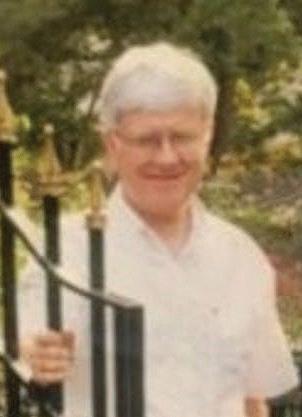
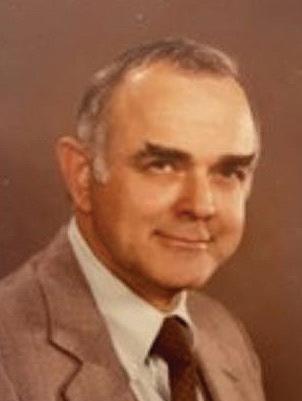
Market Square showroom in High Point, N.C., which eventually grew to 2.25 million square feet, about the same as the Empire State Building. Under Dave’s ownership, Market Square became the most sought-after showroom for textile and furniture companies in the country as well as North Carolina’s largest adaptive-use building.
The economic impact Dave’s efforts had on the High Point region and North Carolina in general led to his being named as the state’s Secretary of Commerce by Democratic Governor Jim Hunt, even though Dave is well known in Republican circles. Governor Hunt didn’t care about party labels, and he wanted a secretary who would relentlessly promote the state’s financial interests. Dave was proud to serve his state in this capacity.
After selling his business, Dave became interested in the Special Olympics, and eventually was instrumental in getting the 1999 Summer Games held in North Carolina, another big win for the state.
Brother Phillips, or more correctly, “Ambassador Phillips,” was thrown into the middle of that diplomatic fracas when appointed in 2007.
Many more details about Dave’s life are covered in his biography, “Come on America: The Inspirational Journey of Ambassador Dave Phillips.” His life story is admirable, and he’s a credit to Delta Kappa Epsilon.
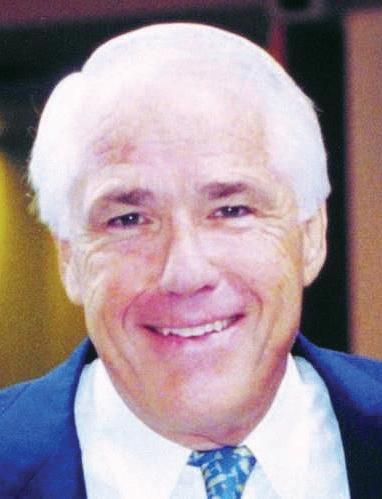
TODD ANTHONY LEIGHT
PSI DELTA-WAKE FOREST ’83
Todd Anthony Leight passed away on Sept. 5, 2022 at the age of 61 from natural causes. A dedicated Wake Forest Deke, he received his undergraduate degree in 1983. He went on to do graduate work in biomedical engineering at the University of North Carolina which helped him launch his career in the medical devices industry, working in sales and sales leadership for several medical device and biomedical companies including Synthes and Stryker. Todd was a long-time resident of Pacific Palisades, Calif. before moving to the Salt Lake City area in 2015.
JERRY SHARPE DUNCAN RHO LAMBDAOKLAHOMA ’59
Jerry Sharpe Duncan was born in Shawnee, Okla. on Dec. 23, 1936 and left this earth on Oct. 1, 2022. He earned a Petroleum Engineering degree from the University of Oklahoma in 1959 and while there he was president of the Deke chapter. Jerry received his law degree from Oklahoma City University School of Law in 1962. He loved golf and traveling with a dear group of friends. He was a talented woodworker, photographer, and Scotch drinker. Jerry was an avid outdoorsman who enjoyed hunting anything that was in season as well as fishing. He took great pride in raising and training his bird dogs.
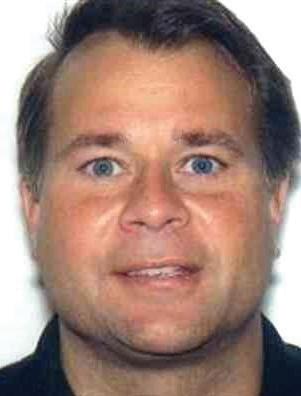
“BART” ROACH, JR GAMMAVANDERBILT ‘56
Robert Bartlett
“Bart” Roach, Jr. was born in Little Rock, Ark. and graduated cum laude from Vanderbilt University in Nashville, Tenn. in 1956. His senior year he was president of the Deke house. He spent two years as an active duty officer in the Navy. After his time in the Navy, he worked at Roach Paper Company in Little Rock, and rose through the company ranks to serve as Chairman and President until 1980.
Bart played varsity tennis at Vanderbilt. He also played in a weekly game with friends up to and beyond his 80th birthday. A lifelong Razorbacks fan, he tried to live up to his rule of “not allowing his Saturday to be ruined by 18 to 22-year-olds” with mixed results. Bart passed away peacefully on Oct. 20, 2022 and is survived by his wife Mary.
JACK KUNCL DELTA PI-
ILLINOIS ’56
Jack Kuncl was the banjo player for the Original Salty Dogs, Chicago Hot Six, Chicago Footwarmers, Riverboat Ramblers and for many years he played at Wrigley Field with the jazz band for the Chicago Cubs. He was also a barbershop quartet singer and member of the DuPage County, Ill. chorus for many years.
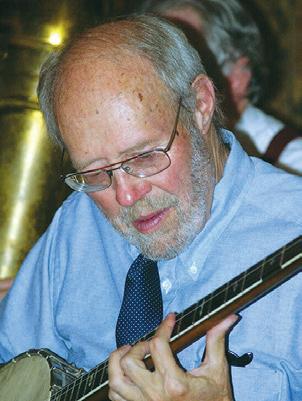
A dedicated member of the Delta Pi chapter of DKE, Jack passed away in December 2020 in Chicago’s western suburbs. He was a regular at the Fred Wells luncheons during Spring Break. When the chapter was reactivated in 2014, Jack attended the reunion at the Union League Club of Chicago that August, Homecoming in October, and Founder’s Day dinner in June 2015. His enthusiasm and good cheer was an inspiration to all.
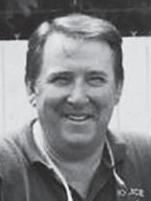
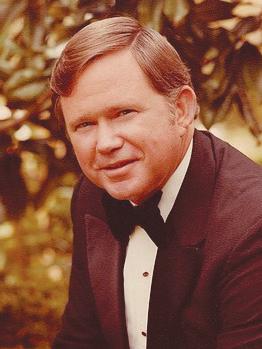
EVAN WORTHINGTON MICHENER III
DELTA KAPPAPENNSYLVANIA ’58
Evan Worthington
Michener III of Maple Glen, Pa., passed away on Oct. 29, 2022 at the age of 85. Evan was a dedicated Deke and a mem-
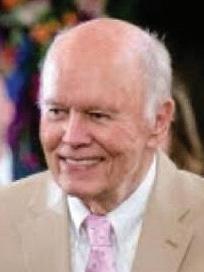
ber of the 1958 class of The Wharton School of the University of Pennsylvania. An ardent family man, brother Michener married his college sweetheart, Nancy, and incorporated a family packaging business in 1977. Evan was a passionate Philadelphia sports fan, avid golfer and highly respected member of the Huntingdon Valley Country Club as well as a longtime summer resident of Ocean City, N.J.
TIM LYNCH IV
GAMMA PHIWESLEYAN ’65
Thomas “Tim” Lynch IV, 79, of Aspinwall, passed away in the comfort of his home Saturday, Nov. 5, 2022. Tim grew up an avid athlete attending Shady Side Academy and became a Deke at Wesleyan University. In 1965, he joined the U.S. Navy, serving two tours of duty during the Vietnam War and earning the Vietnam Campaign Medal with three stars, the Vietnam Service Medal and the National Defense Service Medal. Tim served 43 years as a stockbroker at Moore, Leonard and Lynch before co-founding his own firm, Richards, Lynch and Pegher. In his athletic pursuits, Brother Lynch never acted his age and holds the distinction of being the oldest man on the mountain during the time he climbed Mt. Kilimanjaro.
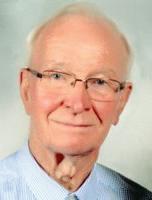
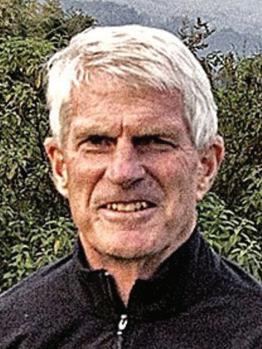
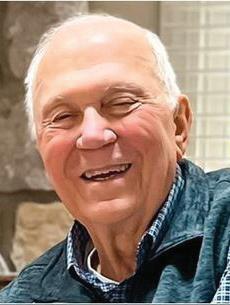
SYD WOOD
DELTA PHIALBERTA ’53
Colonel, The Honorable Judge, Sydney Evan William James Wood, CD, QC, passed away on Nov. 7, 2022, in Kelowna, British Columbia at age 89. Educated in Edmonton schools he entered the Canadian Services College Royal Roads in September 1950 as a cadet in the Royal Canadian Air Force. He obtained his BA in 1953 and his LLB from University of Alberta in 1956. Syd, a loyal Delta Phi Deke, spent summers continuing his training as a pilot with the Air Force Reserves. He joined the City of Edmonton’s 418 RCAF Squadron in August 1954 and was the wing commander of the search and rescue squadron.
Syd joined his father’s firm Wood, Haddad, Moir, Hyde & Ross and was admitted to the bar in 1957. After serving as a partner in private practice, Syd joined the Provincial Court of Alberta in 1993 and served in Edmonton and Calgary courts until 2003.
JOHN DANIEL MCGONAGLE MU-COLGATE ’65
John McGonagle, the founder and longtime owner of Seacoast Harley-Davidson in North Hampton, N.H., and resident of Governor’s Island, N.H., and Naples, Fla., passed peacefully on Nov. 11, 2022. John was a decorated Marine Corps pilot and successful businessman. A proud member of Delta Kappa Epsilon, John forged profound friendships at Colgate that lasted his entire life. As a Colgate alumnus, John remained active in recruiting hockey players for the college for several years, and later had the privilege as a member of the class of ‘65 to fundraise for and dedicate the school’s new state-of-theart hockey arena in 2016. During his military career, John was awarded the National Defense Service Medal, Air Medal, Vietnam Campaign Medal, Vietnam Service Medal, and the Vietnam Cross of Gallantry with Palm and Frame Meritorious Unit Citation.
THOMAS CRAWFORD, JR GAMMAVANDERBILT ’60
Tom Crawford passed away in Roswell, Ga. on Oct. 2, 2022. A devoted Gamma Deke, Tom participated in the Navy ROTC program while earning a degree in finance. He worked as a CPA for several companies throughout his career, most notably Rust Engineering and Hardin Construction Company. His successful career led he and his family to Pittsburgh, Atlanta, and San Antonio. Later starting his own consulting firm, Tom loved to encourage young entrepreneurs by sharing his wealth of knowledge about business planning and finance.
GENE MARTINI
GAMMA PHIWESLEYAN ’65
Eugene “Gene” Newton Martini graduated from Wesleyan University in 1967 and was a loyal Deke brother. Gene began his career at IBM and later became a serial entrepreneur, starting several successful companies. In 2004 he launched Infinity Rail. This company, now Infinity Transportation, manages 42,000 railcar and intermodal assets

MYSTIC CIRCLE OF ∆KE
across North America and employs over 30 people across the country. Tie & Timber Technologies creates rail ties and other lumber products in the Mullins, S.C. area.
BUDDY NOEL ZETA ZETALSU ’50
Lawrence Joseph

“Buddy” Noel III, a third generation farmer who lived his entire life in the Donaldsonville, La., area, died November 21 – hours before his 94th birthday. While farming was his obsession, Buddy’s business interests were broad and varied after an early start as a principal in a John Deere dealership that grew to 17 locations across Louisiana. His service to his community ranged from participation on the local school board for 16 years to presiding over port activities in Baton Rouge, being appointed to the Greater Baton Rouge Port Commission by Governor Dave Treen. He was elected President of that Commission in 1991. Active in the banking community, Buddy also had served as president of the bank, acquired by Hibernia, that later became Capital One.
ROBERT SHAW BRIDGES JR LAMBDAKENYON ’86
Robert “Rob” Bridges Jr., who graduated from Deerfield Academy and Kenyon College, where he earned All-America honors as a diver and member of the national championship swim team, died in December 2022 in Vero Beach, Fla. Rob was a loyal and dedicated Lambda Deke as well as a long term Board Member of the DKE Club of New York City. Rob had a long and successful career in investment management. Rob was a devoted member of Christ Church Greenwich, Conn., serving others, packing, and serving meals to those in need, as well as through his service on the Board of the FPWA in New York City. In his free time, Rob enjoyed golfing, hiking, skiing, vacationing in Maine, and cheering on his sons at swim meets and water polo matches.
GARY FITTS GAMMAVANDERBILT ’55
Travis Gary Fitts, the son of a Deke, was born in Tuscaloosa, Ala. in 1933 and died on May 28, 2022. Although himself a Gamma Deke, most of the other Fitts boys were proud Psi Dekes. The long legacy line includes Gary’s great-grandfather Philip Augustus Fitts, Psi 1857; his father, James Harris Fitts III, Psi 1923; his son, Travis Gary Fitts, Jr., Psi 1981; his second son, Joseph David Fitts, Psi 1982; and his grandson, Travis Garrett Fitts, Psi 2016.
Gary was a true gentleman in every sense, he placed the welfare of others ahead of his own. He believed in giving back to his community and served in leadership posts in many civic organizations. Gary was an avid outdoorsman who loved to fish and hunt. He was a skilled craftsman and a tennis player throughout his life.
Upon graduating he was commissioned as 2nd Lt. USMC and attended flight school in Pensacola, Fla., the start of a 30-year-plus career as a naval aviator. Later, he joined his Father, Jim Fitts Jr., in the family insurance business. Under his leadership, Fitts Agency Inc. flourished and upon Gary’s retirement was one of the largest independent insurance agencies in western Alabama.


KENNETH E. MILLER SIGMA RHOSTANFORD ’54
Dr. Kenneth E. Miller, a proud and loyal Deke at Stanford University who later earned the nickname Dr. Wonderful, passed away on Dec. 14, 2022. Upon graduation from Stanford, Ken joined the Navy and was an aviation cadet in Pensacola, Fla. He served with the VS 21 squadron on the aircraft carrier USS Philippine Sea in the western Pacific. Discharged from the Navy in 1958, he started medical school at Hahnemann College of Medicine in Philadelphia, Pa. Ken joined San Diego Diagnostic Radiology Group as a pediatric radiologist, practicing at Sharp Memorial Hospital and Children’s Hospital of San Diego. Ken started the first radiology
BETA-NORTH CAROLINA
Fred Maner ’53
DELTA PHI-ALBERTA
Bob Nicholl ’51
GAMMA-VANDERBILT
Lewis Stabler Jr. ’58
KAPPA EPSILONWASHINGTON
Kirk Adams ’58
department at Children’s Hospital in 1985. Ken retired from medicine in 1993.
STEVE COFFIN THETABOWDOIN ’62
Steven E. Coffin, who learned to play the tuba at Mount Desert High School in Northeast Harbor, Maine, went on to be part of the Bowdoin College Marching Band and a devoted brother in Delta Kappa Epsilon, passed away on Dec. 25, 2022. Steve was delighted to attend his 55th college reunion in 2017. He loved his years at Bowdoin and maintained friendships with many of his fraternity brothers until his stroke in November 2021.

At Ellsworth High School, Steve taught English for 31 years and coached cross-country for over 20 years, winning six state championships for both boys and girls. Steve dedicated his time over the years to many local organizations, including Frenchman Bay Conservancy, Hancock Historical Society, Hancock Town Planning Board and the Mount Desert Island Hospital Board.
KENTO YASUHARA

DELTA CHICORNELL ’04
Dr. Kento Yasuhara, who was just 40 years old, passed away January 11 after a brief Illness. More than a dozen of his Deke brothers from the late ‘90’s and 2000’s joined a recent Celebration of Life Zoom call and shared fond stories. Just a few months ago Kento participated in an alumni event with the Fall pledges at Delta Chi chapter. Dr. Yasuhara joined the University of New Haven staff in 2013 as an assistant professor in Psychology. He was an accomplished clinical and forensic psychologist and an expert on the intersection of mental health and criminal justice with his research published is a variety of academic journals. Kento was highly regarded by both students and colleagues and respected for his leadership of the university’s curriculum committee.
PSI-ALABAMA
Rufus Partlow Jr. ’51
Louis Finlay Jr. ’54
John Langus ’62
Newt Reynolds ’63
ZETA ZETA-LSU
William Zetzmann III ’77
Eric Folse ’84

∆KE CHAPTER ROLL • WINTER 2023
CHAPTERS ARE LISTED IN THE ORDER THEY WERE FOUNDED
PHI†
PSI
CHI
BETA
DELTA
KAPPA
LAMBDA
ETA
IOTA
RHO
TAU
BETA PHI
PHI CHI
PSI OMEGA*
DELTA CHI
DELTA DELTA
PHI GAMMA
THETA ZETA
PHI EPSILON
SIGMA TAU
ALPHA PHI
DELTA KAPPA
TAU ALPHA
SIGMA RHO
DELTA PI
KAPPA EPSILON*
ALPHA TAU
DELTA PHI
PHI ALPHA
TAU DELTA
PSI DELTA
SIGMA ALPHA
SIGMA PHI*
PI BETA
EPSILON RHO
NU ZETA
PHI SIGMA
ZETA CHI
OMEGA OMEGA
BETA DELTA
SIGMA KAPPA
DELTA TAU
TAU CHI
BETA TAU
SIGMA XI
DELTA ALPHA
GAMMA IOTA
PHI MU
CHI BETA
ZETA GAMMA
PI ALPHA
DELTA RHO
TAU BETA
LAMBDA TAU
ALPHA OMICRON
KAPPA BETA
NU ALPHA
ZETA THETA
TAU GAMMA
MU CHI*
ALPHA EPSILON*
SCHOOL
Yale University
University of Alabama
University of Mississippi
University of North Carolina
University of South Carolina
Miami University
Kenyon College
University of Virginia
Centre College
Lafayette College
Hamilton College
University of Rochester
Rutgers University
Rensselaer Polytechnic Institute
Cornell University
University of Chicago
Syracuse University
University of California at Berkeley
University of Minnesota
Massachusetts Institute of Technology
University of Toronto
University of Pennsylvania
McGill University
Stanford University
University of Illinois
University of Washington
University of Manitoba
University of Alberta
University of British Columbia
University of the South
Wake Forest University
Virginia Polytechnic Institute
Villanova University
Troy University
Duke University
Pace University
Bryant University
Bentley University
University of Arizona
University of Georgia
Michigan State University
The Ohio State University
Texas A&M University
University of Victoria
St. Joseph’s College
Auburn University
Gannon University
Manhattan College
University of North Carolina Wilmington
Hampden-Sydney College
University of Missouri
North Carolina State University
Simon Fraser University
University of Tennessee
University of Colorado
University of Illinois-Springfield
Northeastern University
Washington State University
Texas Tech
Maryville College
New Haven, CT
Tuscaloosa, AL
Oxford, MS
Chapel Hill, NC
Columbia, SC
Oxford, OH
Gambier, OH
Charlottesville, VA
Danville, KY
Easton, PA
Clinton, NY
Rochester, NY
New Brunswick, NJ
Troy, NY
Ithaca, NY
Chicago, IL
Syracuse, NY
Berkeley, CA
Minneapolis, MN
Cambridge, MA
Toronto, Ontario Canada
Philadelphia, PA
Montreal, Quebec Canada
Stanford, CA
Champaign, IL
Seattle, WA
Winnipeg, Manitoba Canada
Edmonton, Alberta Canada
Vancouver, British Columbia Canada
Sewanee, TN
Winston Salem, NC
Blacksburg, VA

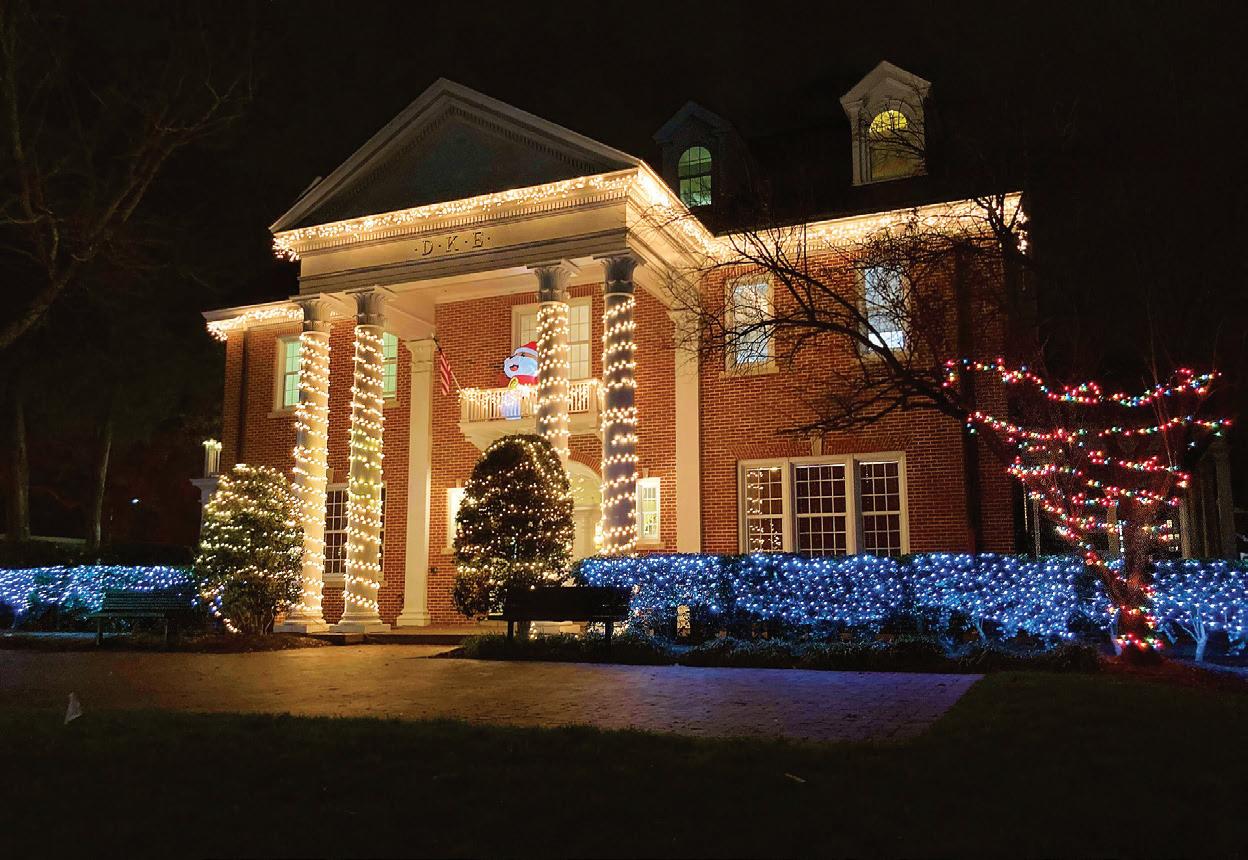
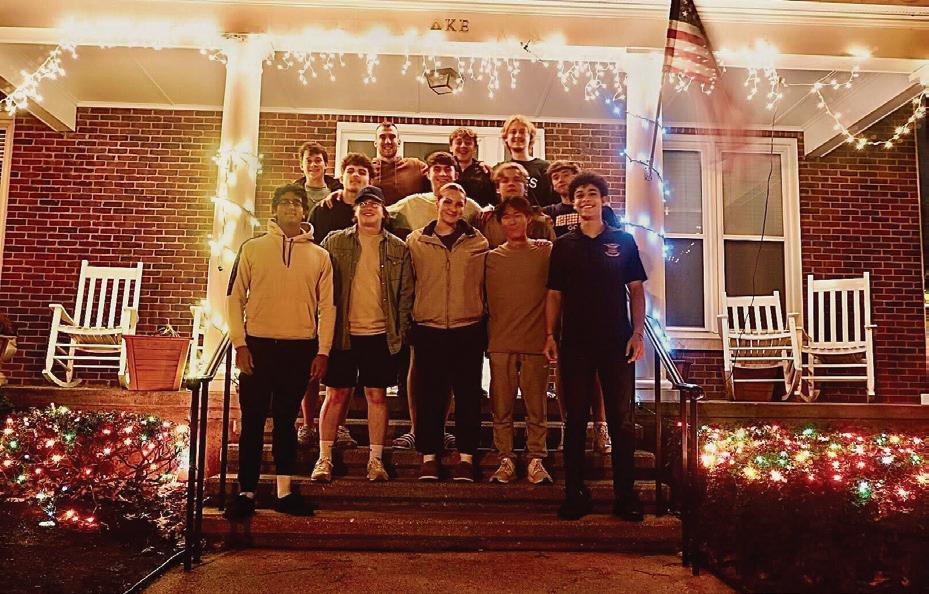
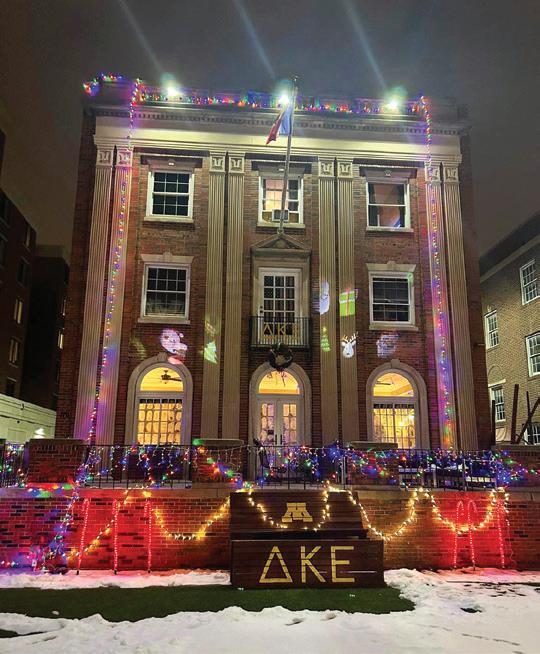
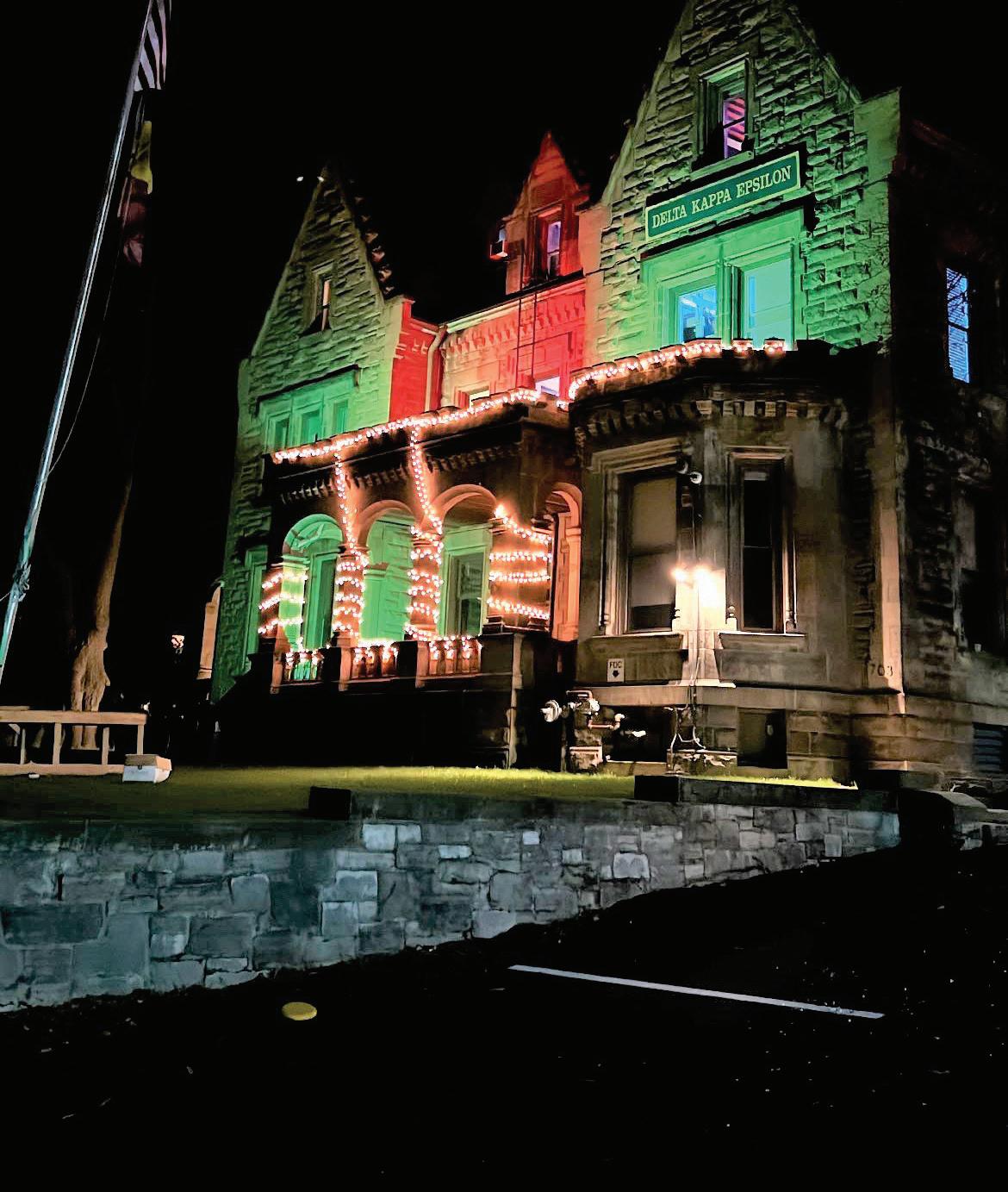
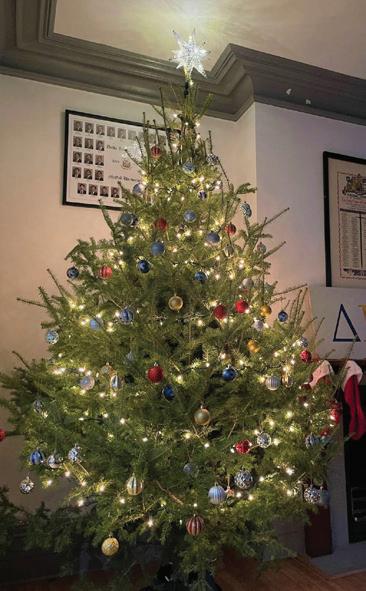
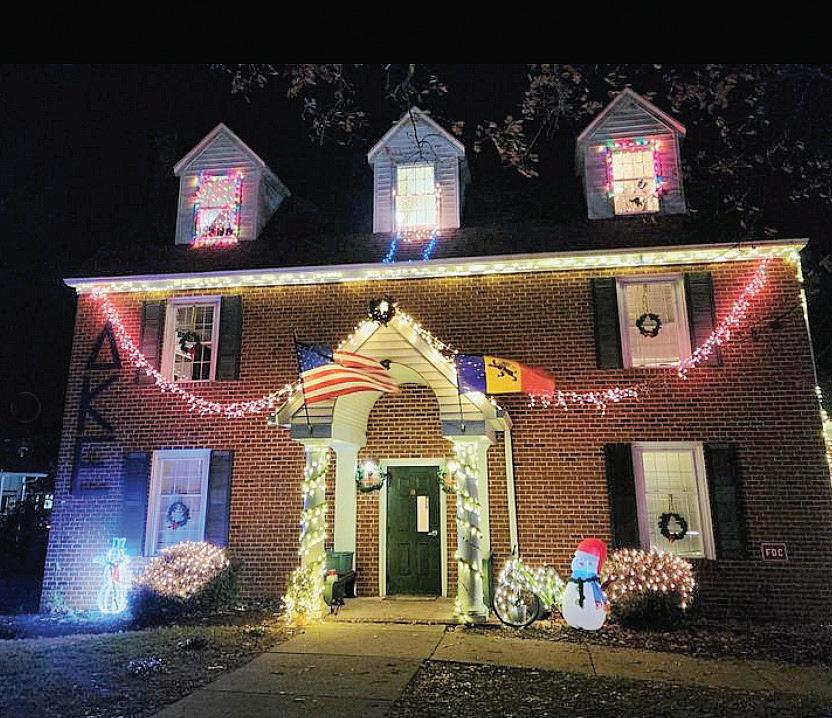 DELTA KAPPA EPSILON FRATERNITY
DELTA KAPPA EPSILON FRATERNITY

